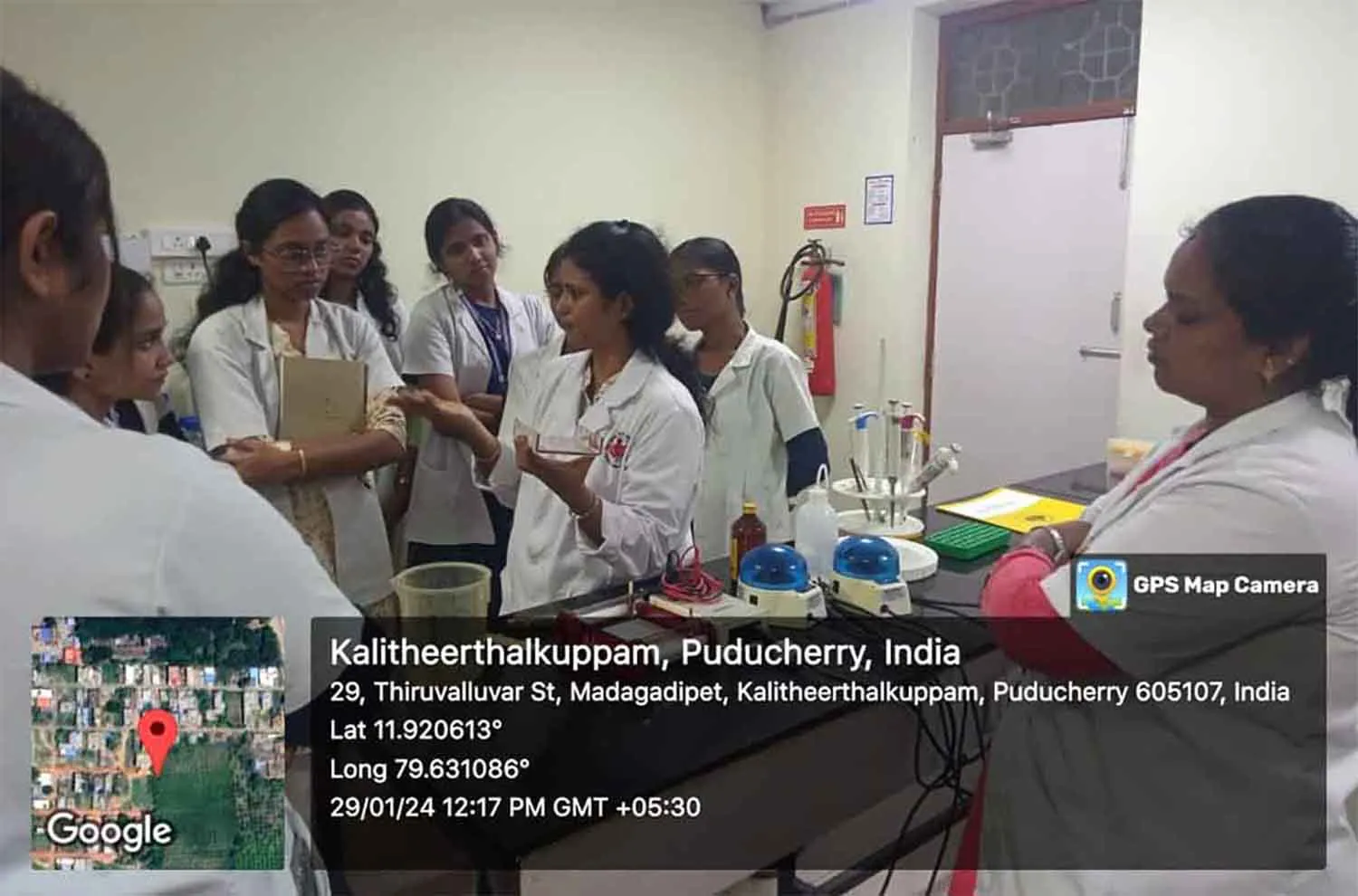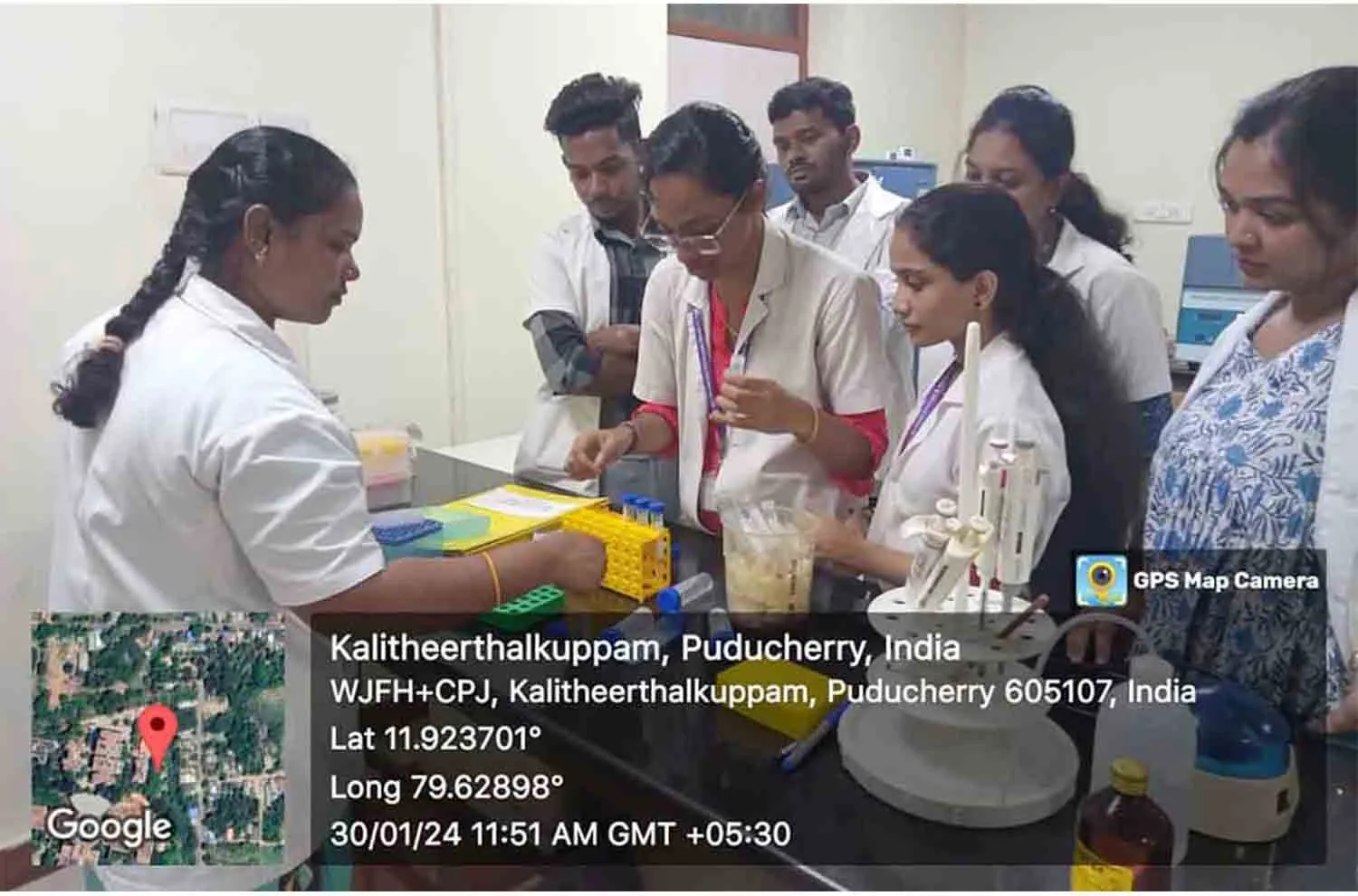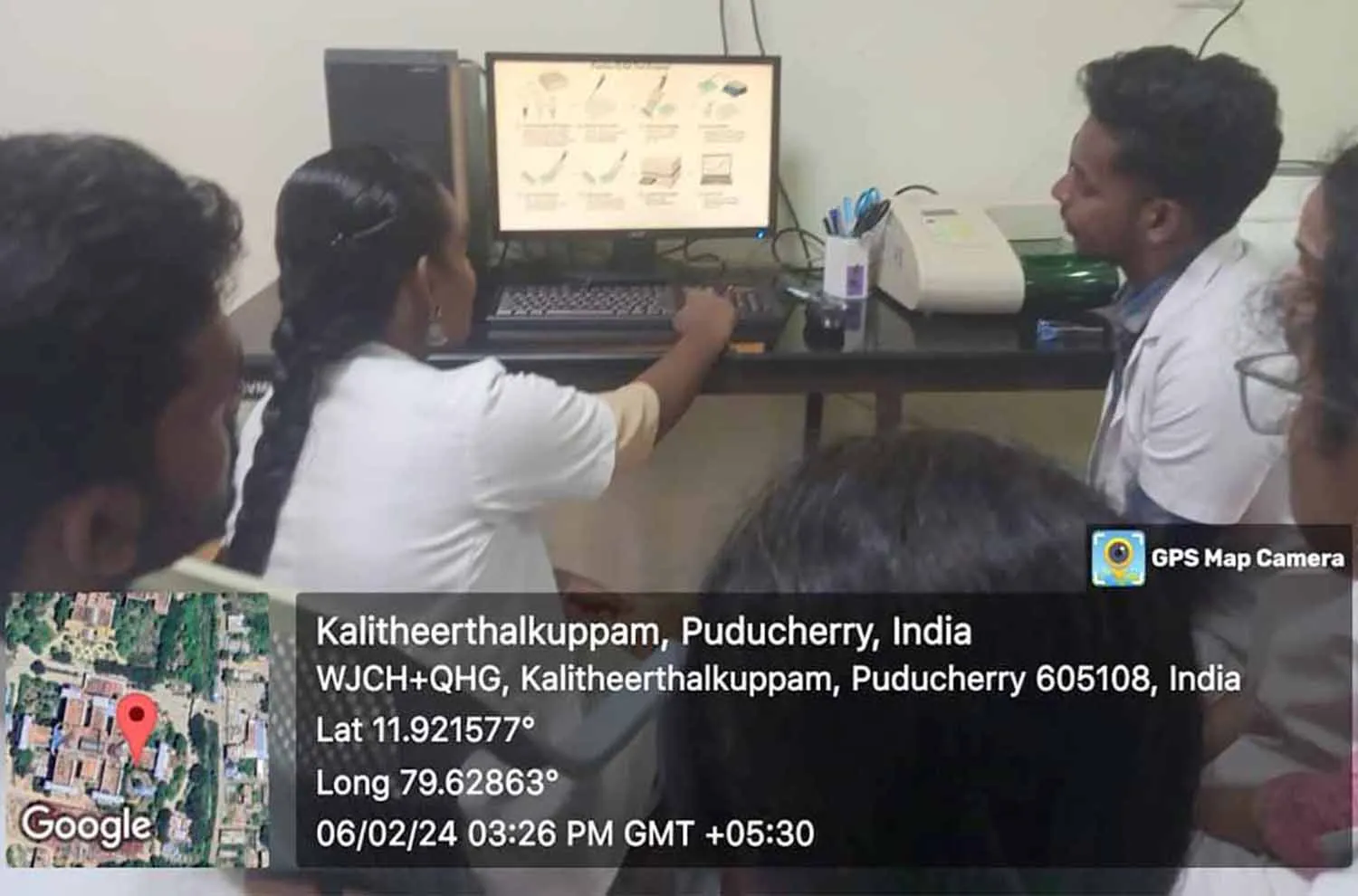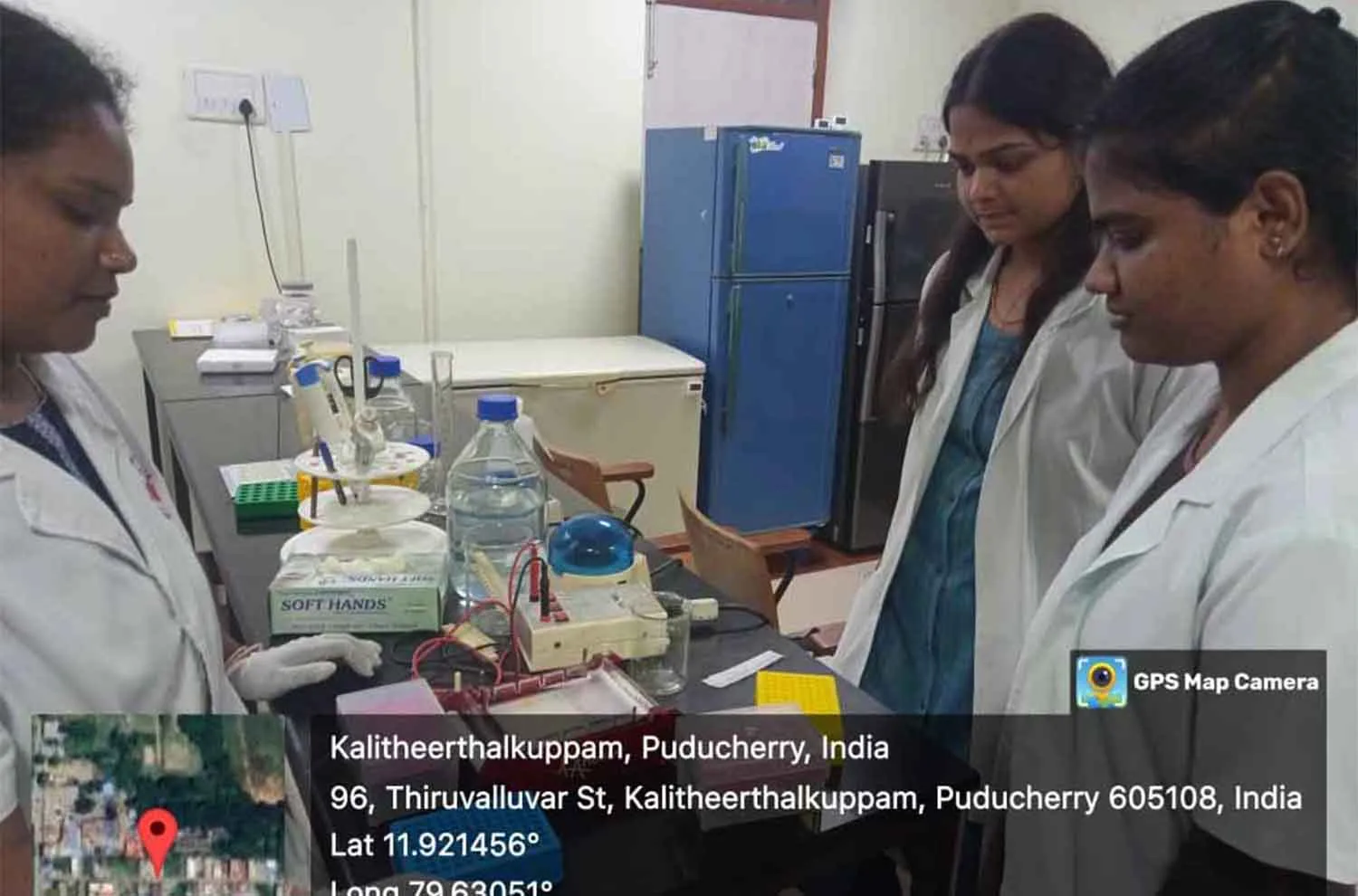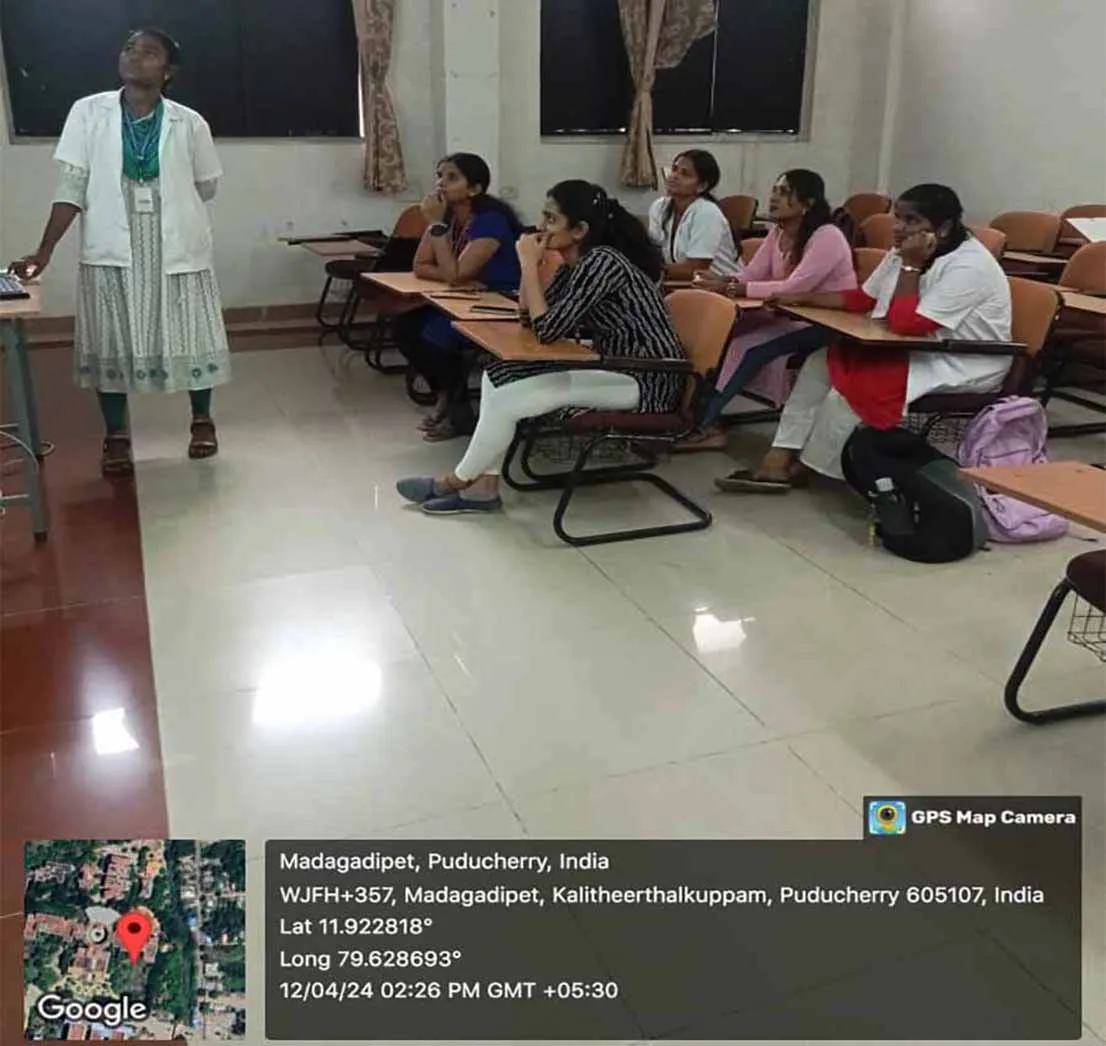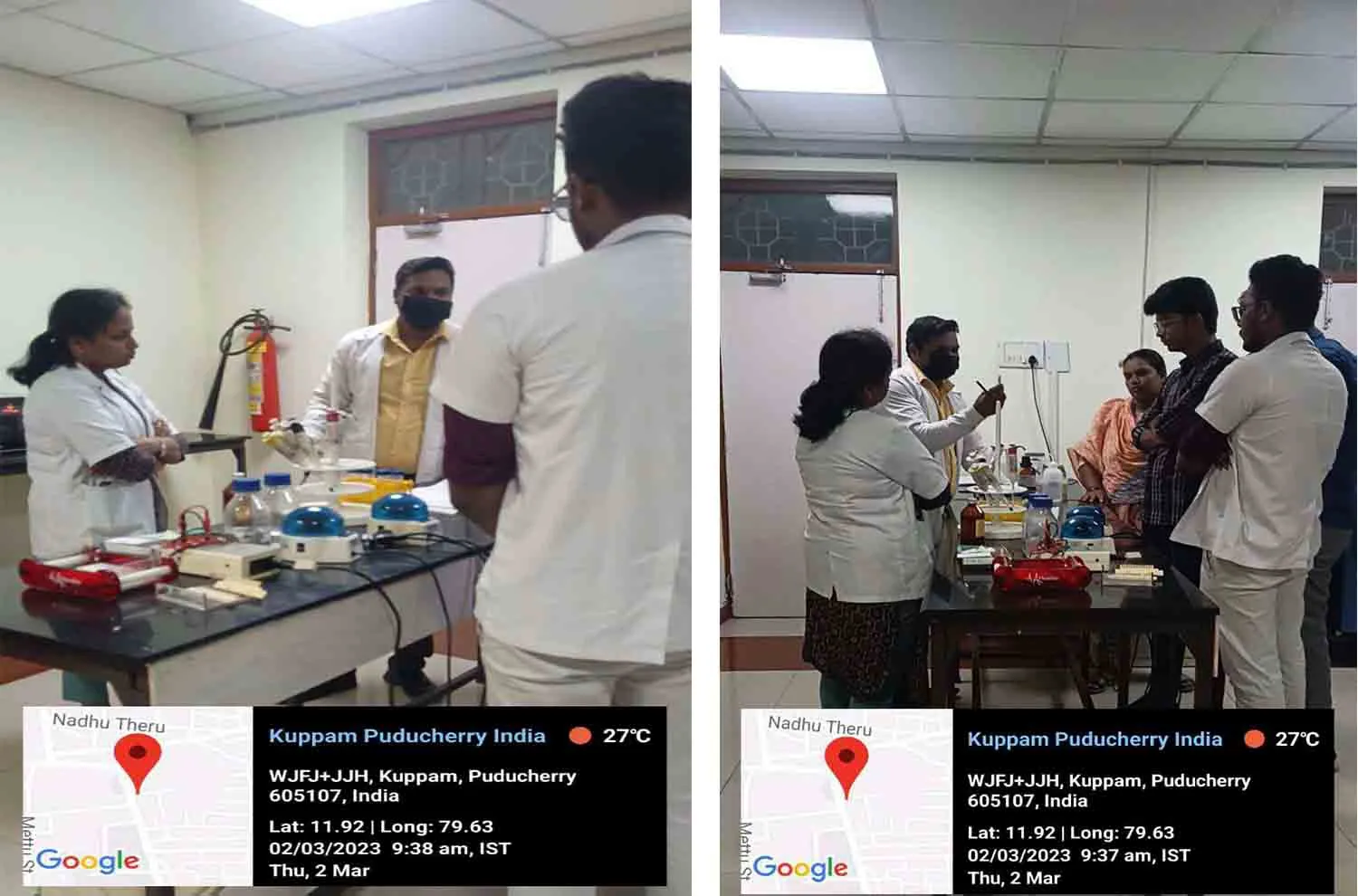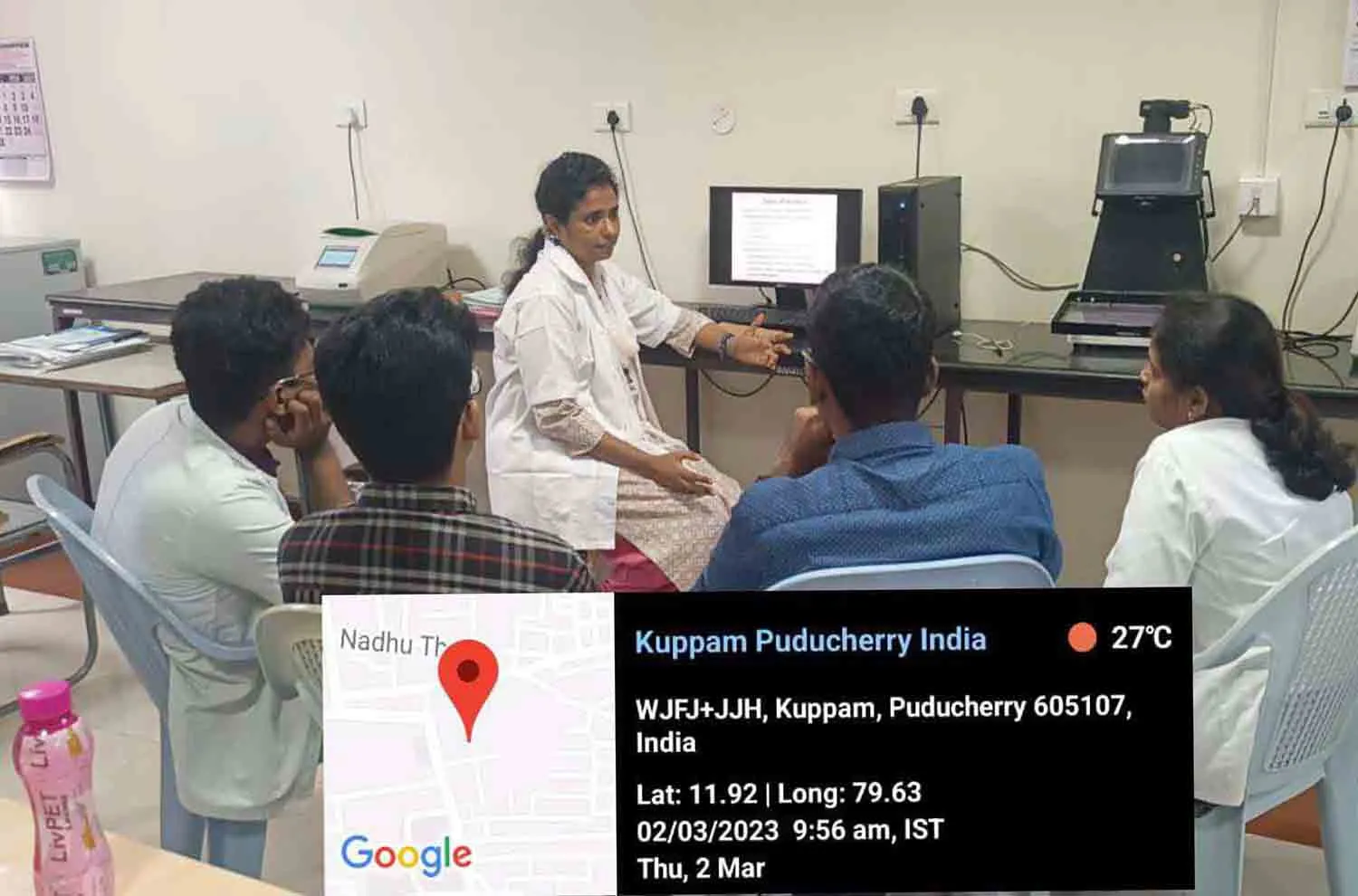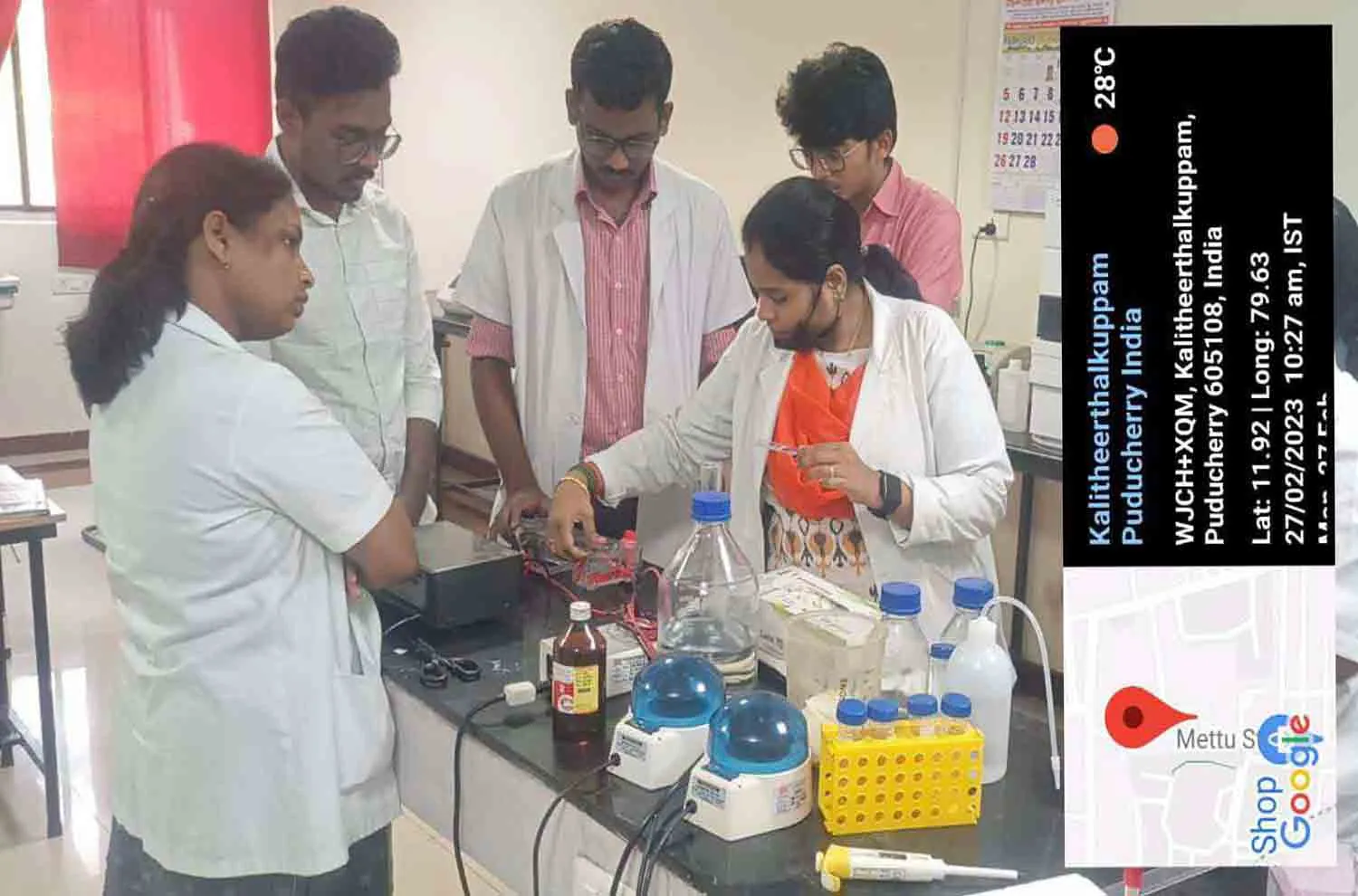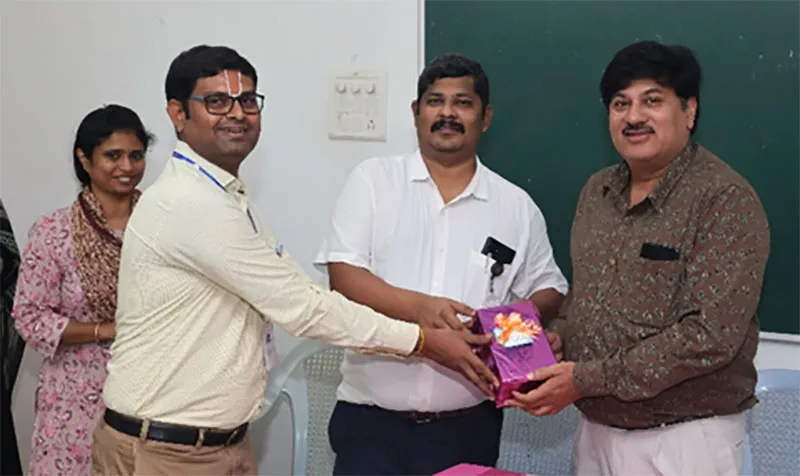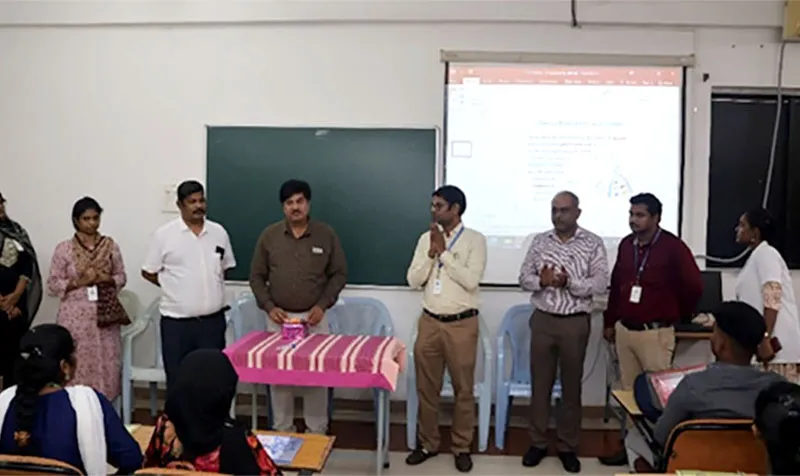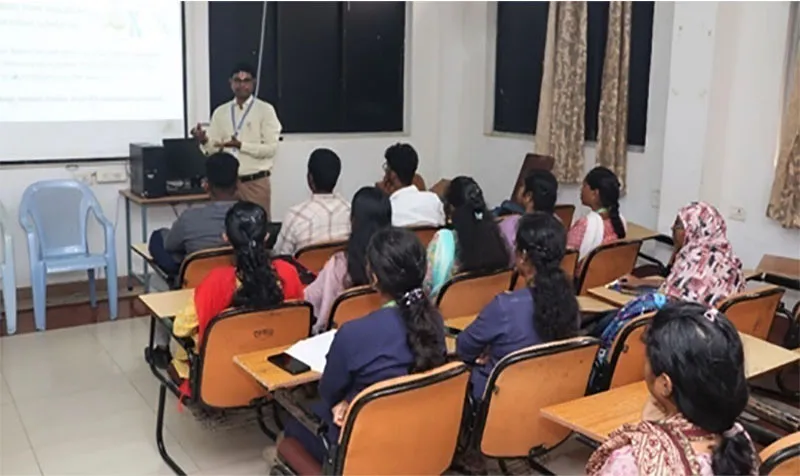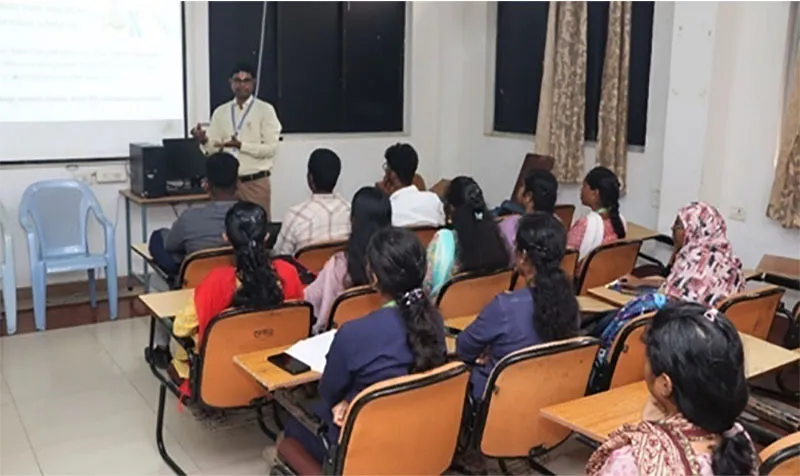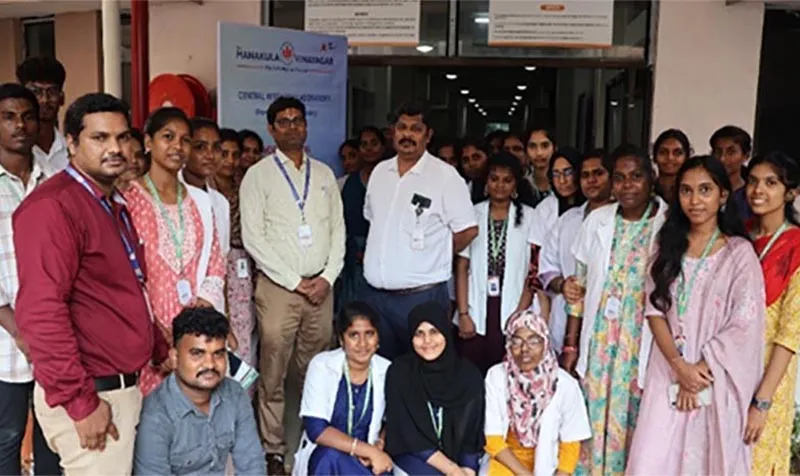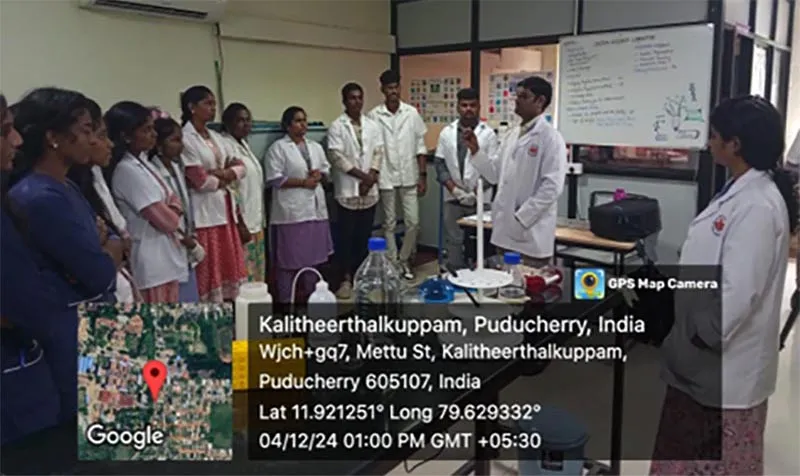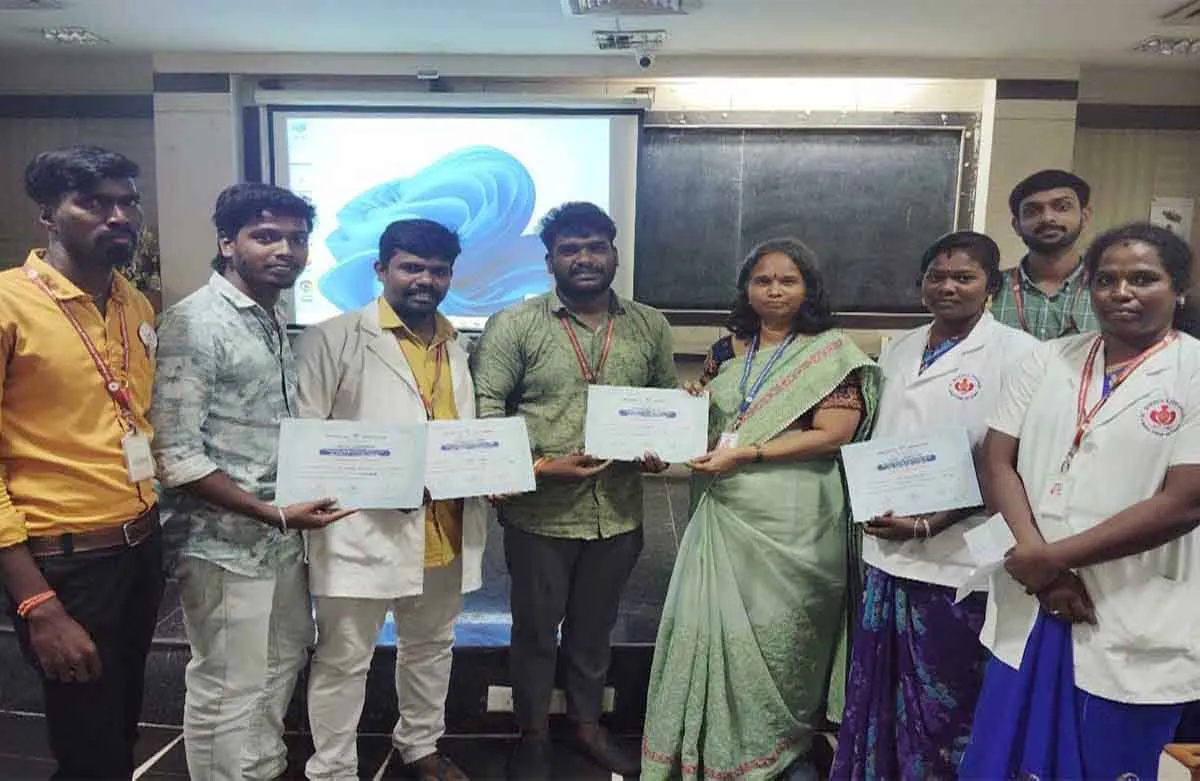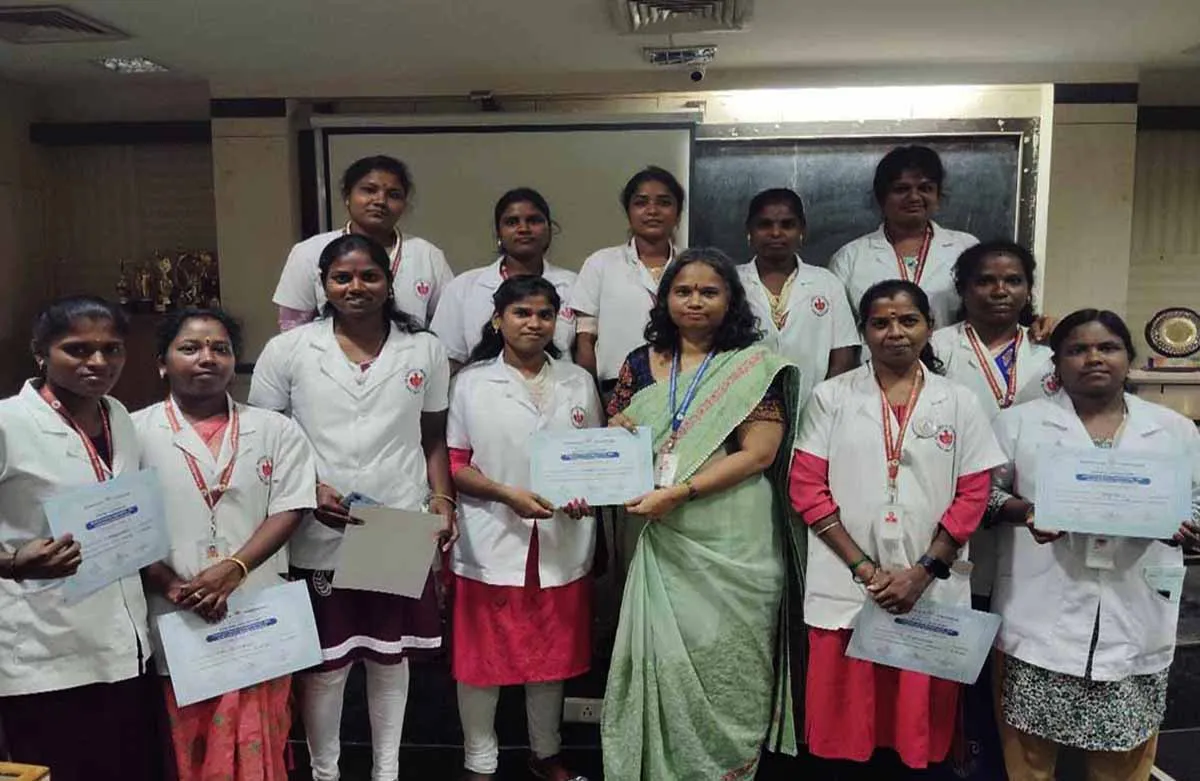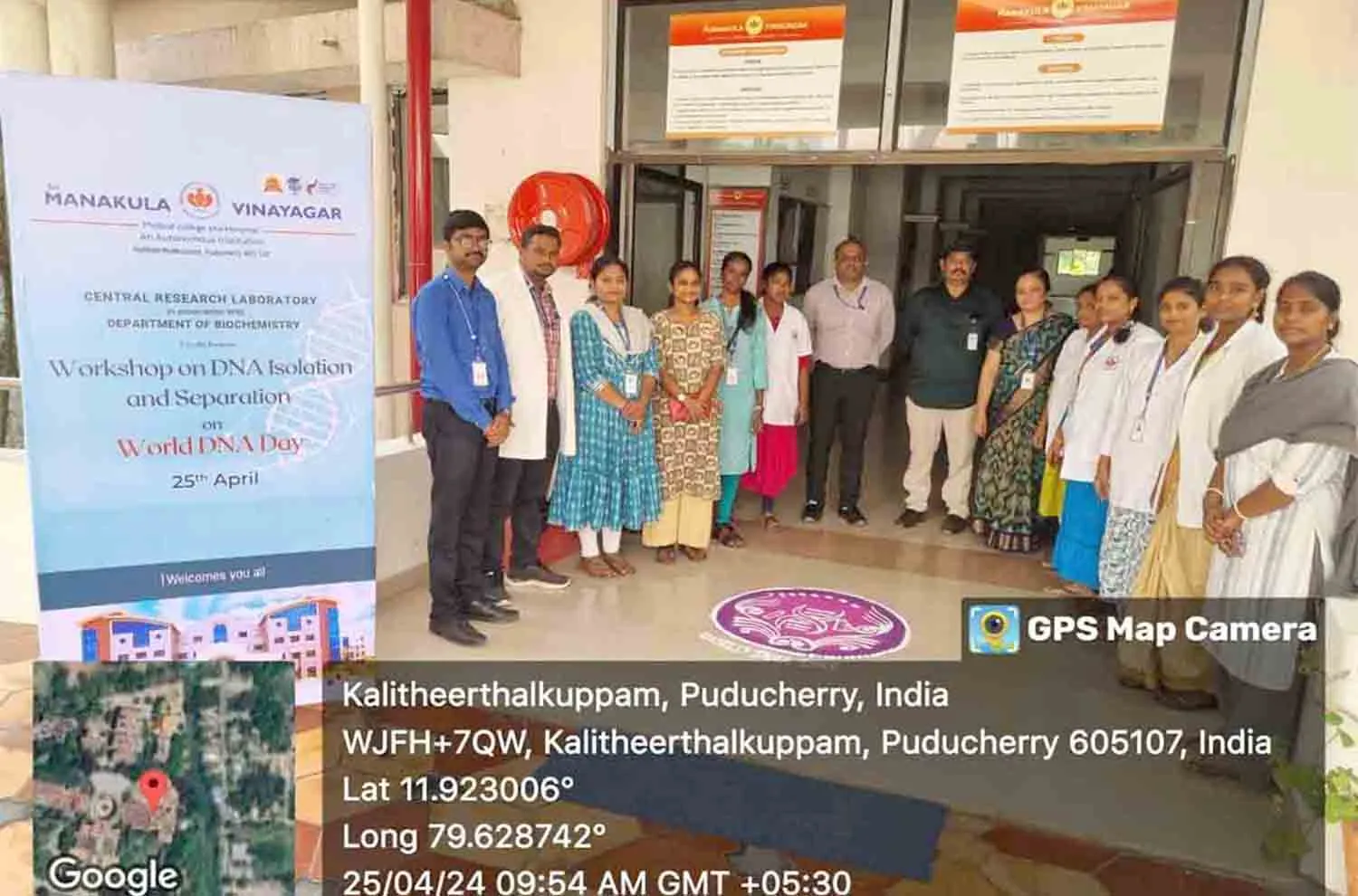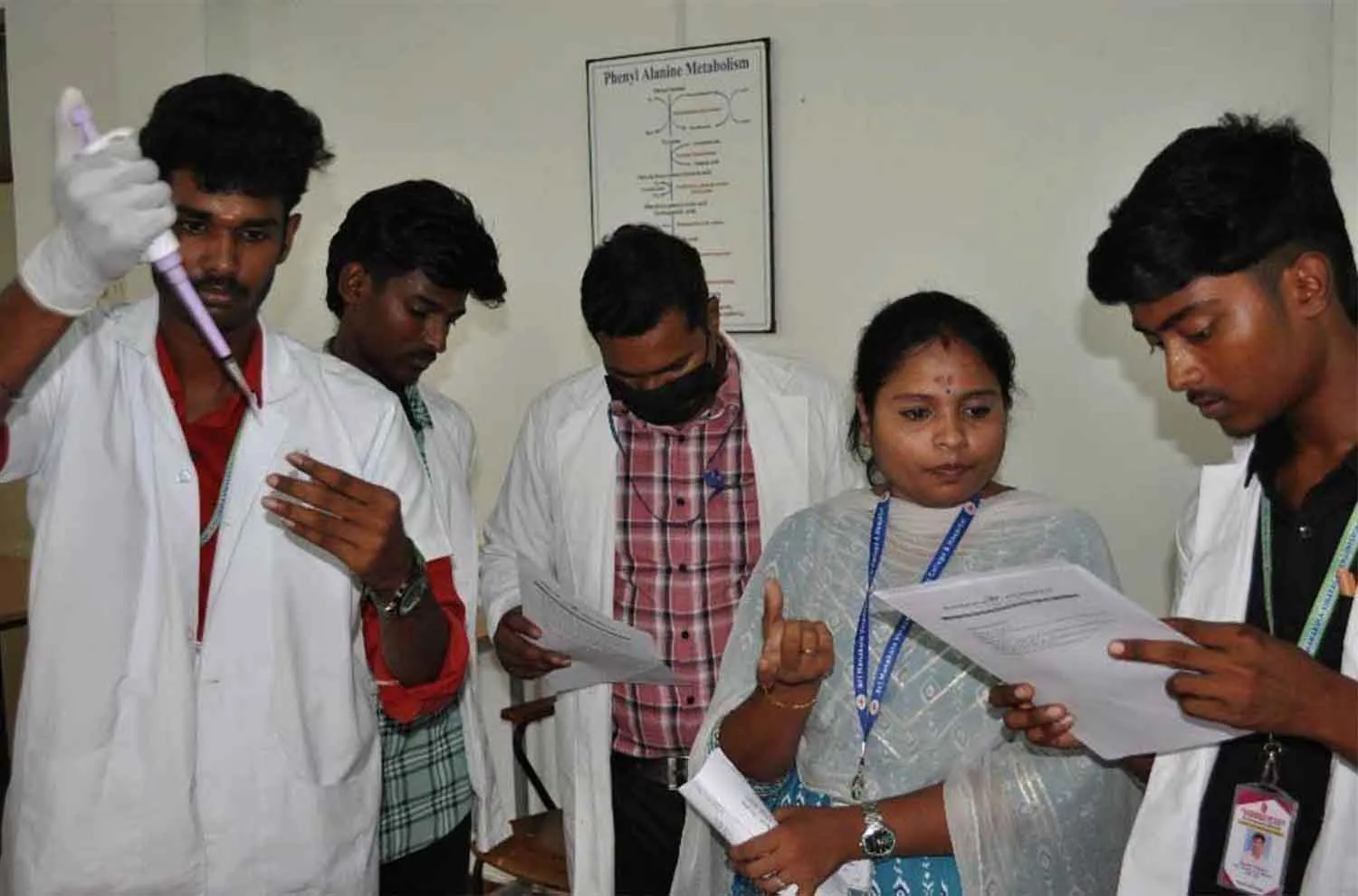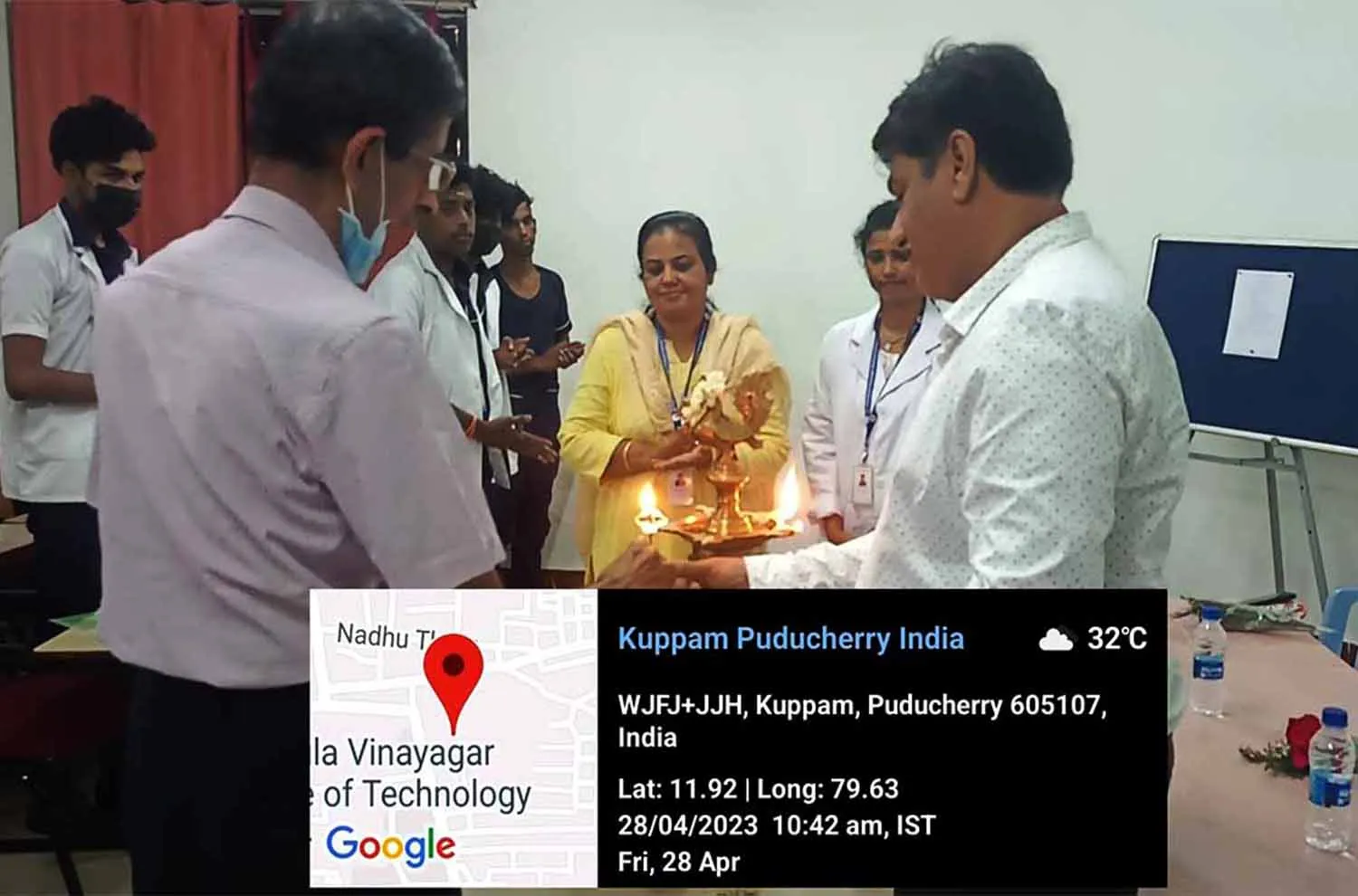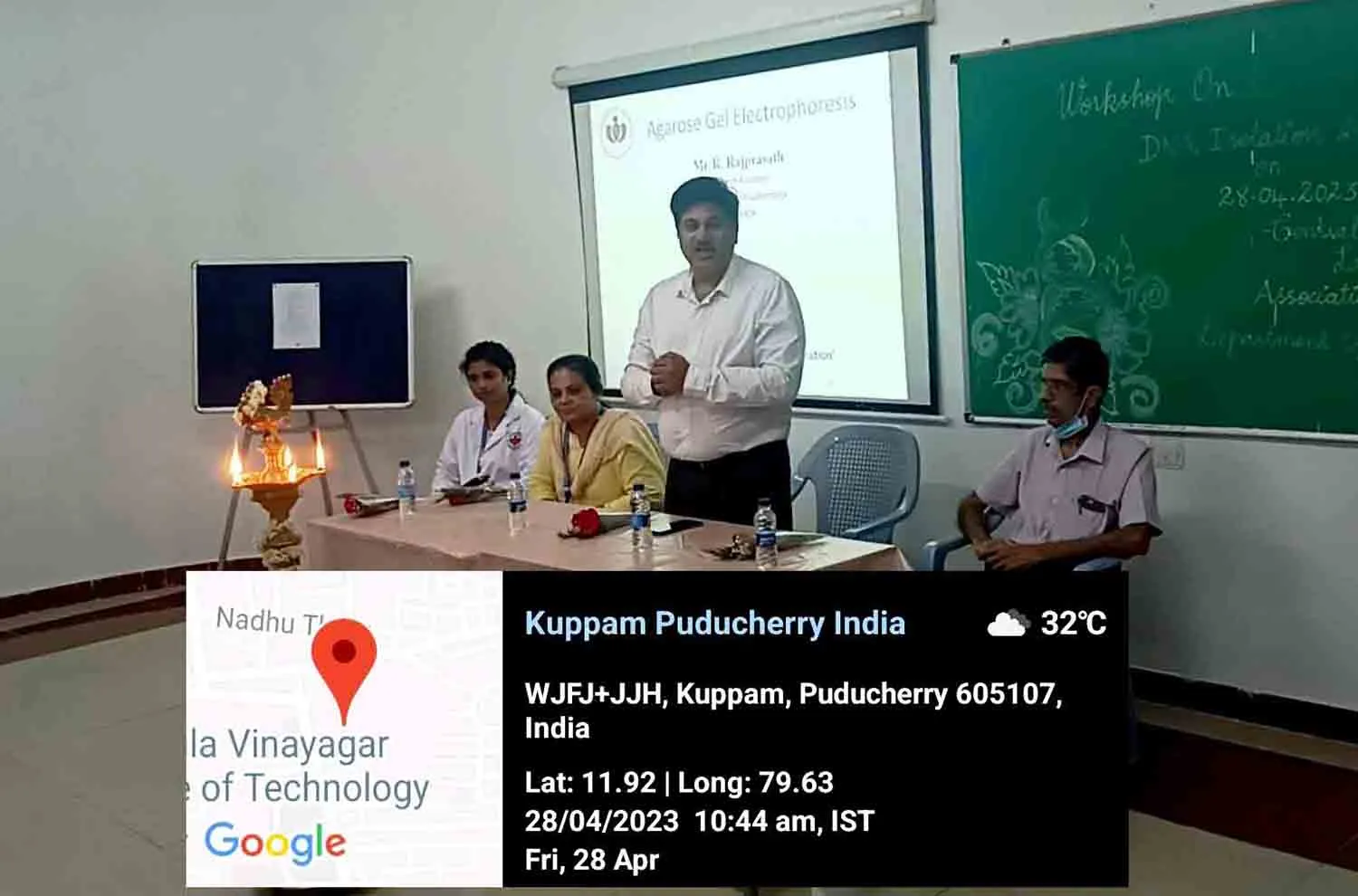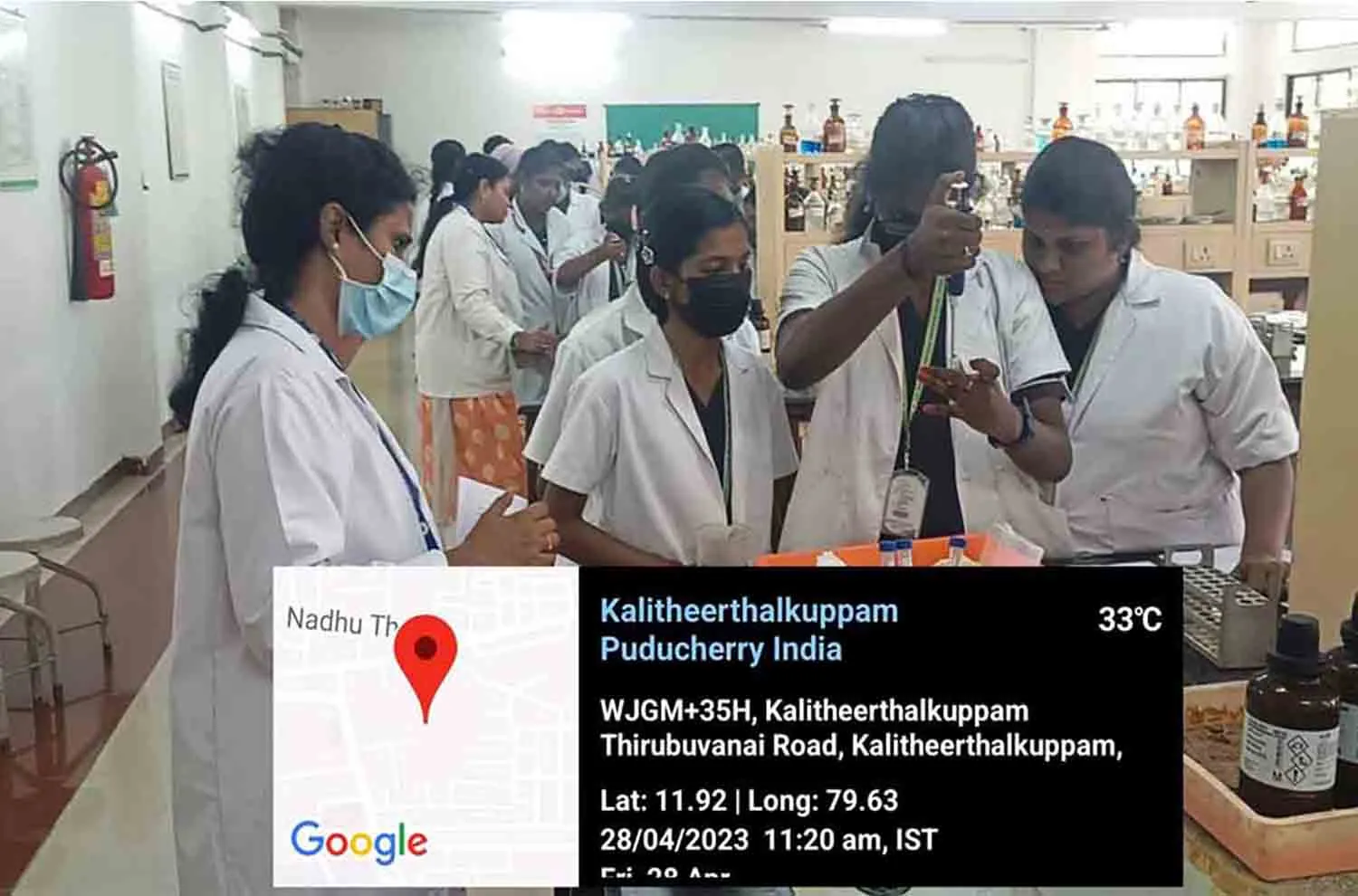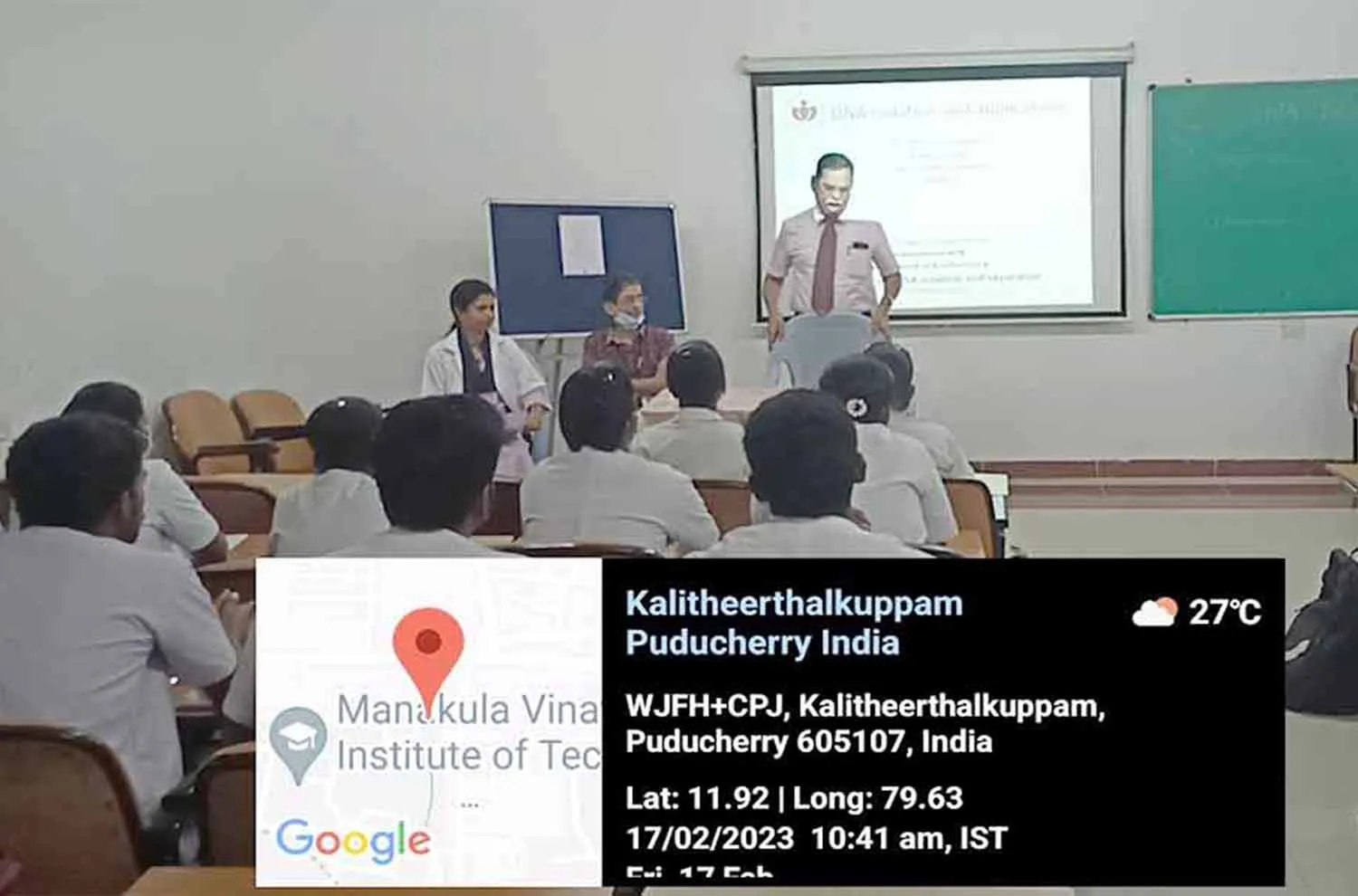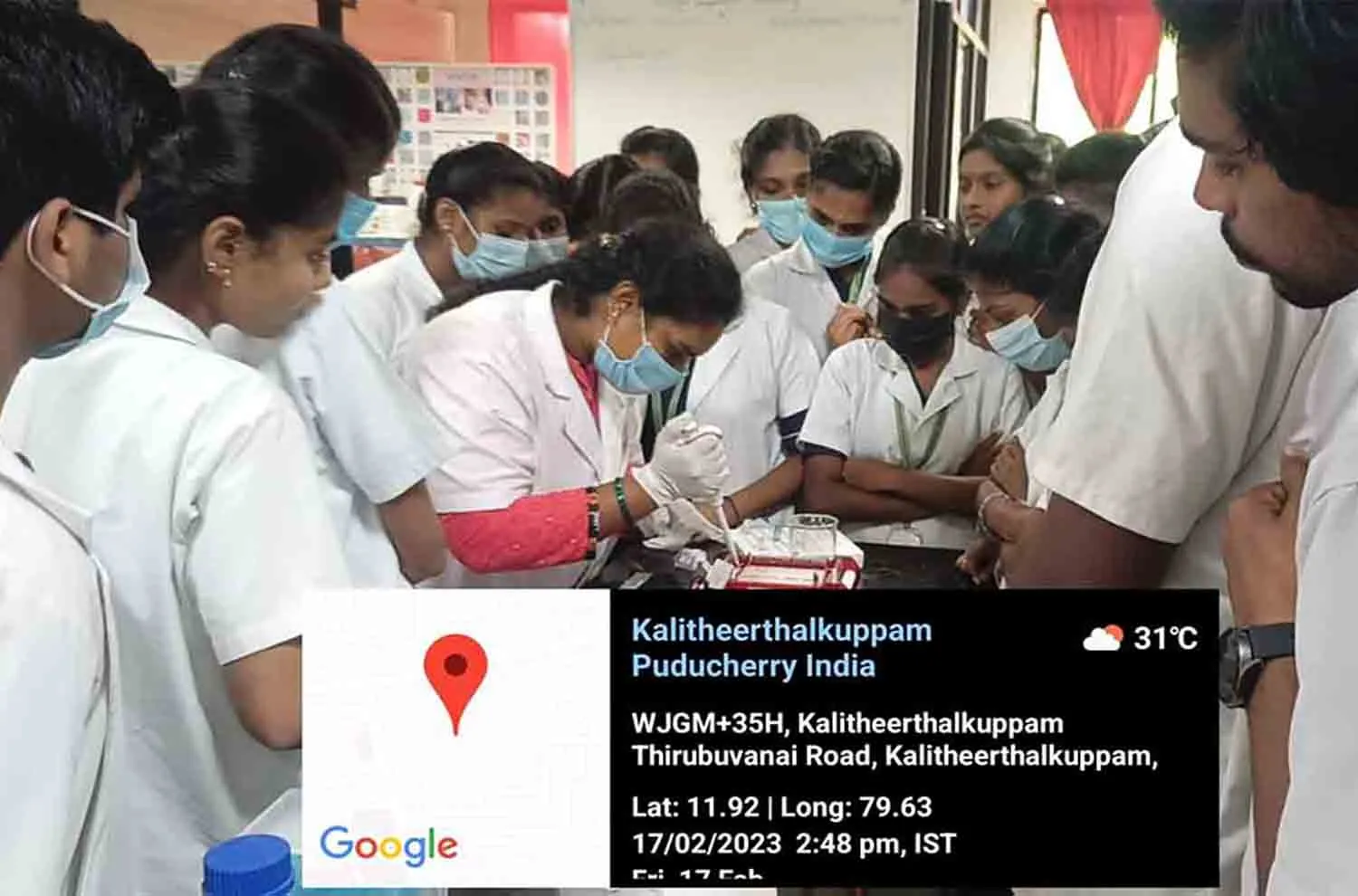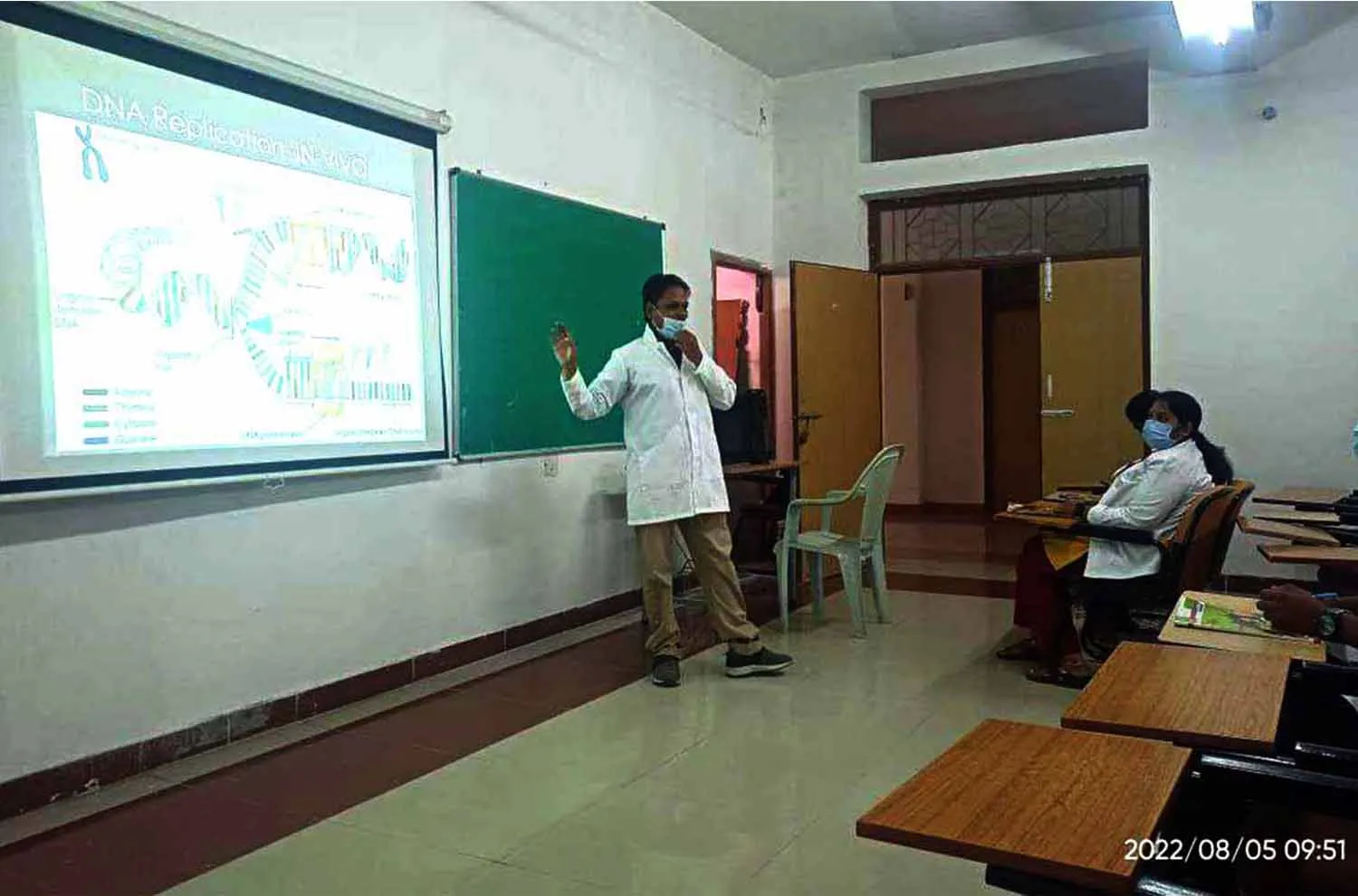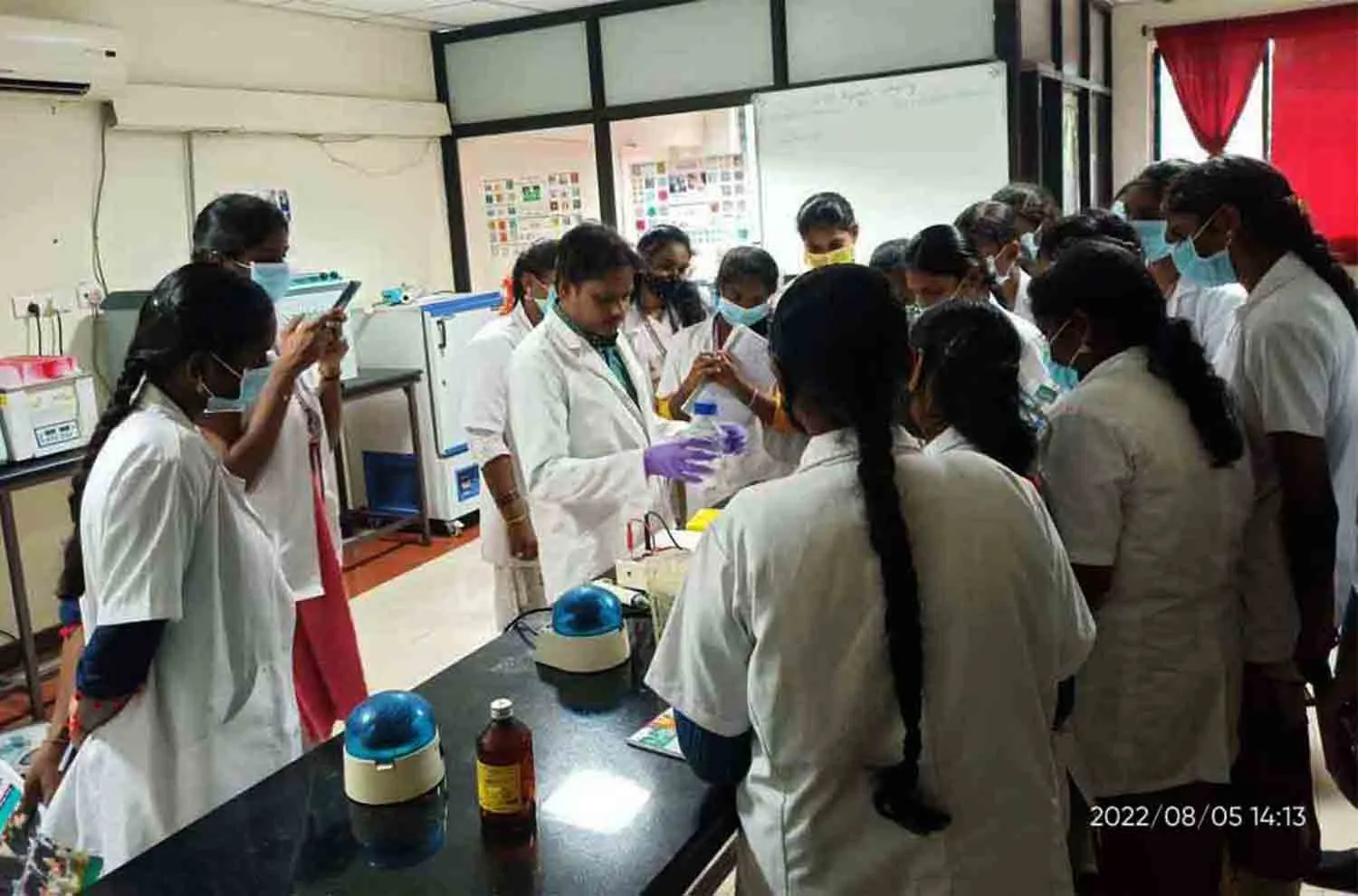Central Research Laboratory (CRL) was started in 2012 to provide centralized research infrastructure for the benefit of investigators across multiple disciplines at Sri Manakula Vinayagar Medical College and Hospital (SMVMCH). CRL is located on the first floor of the college building in the Department of Biochemistry.
Central Research Laboratory (Department of Biochemistry)
About Us
CRL supports PG & UG students, faculties and PhD scholars, for their research activities by providing technical assistance and access to advanced scientific instruments. The research may be in the form of undergraduate research projects, postgraduate dissertation work, PhD thesis work and faculty research projects. In addition, CRL organizes training programmes, workshops/seminars and CME’s for students, faculties and research scholars in the focused areas of research.
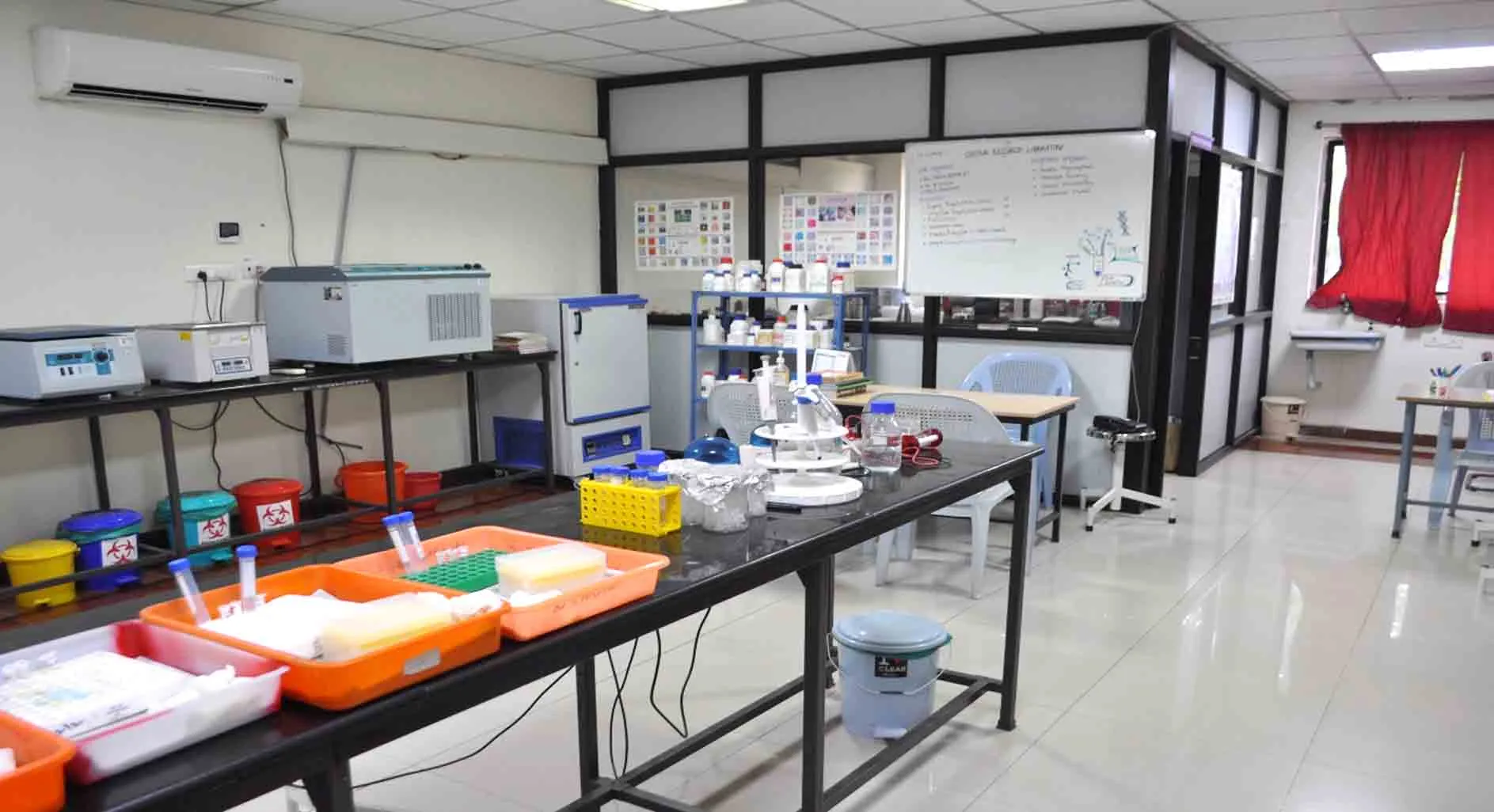
The laboratory holds facility for DNA, RNA and protein isolation and analysis with the support of necessary equipment, such as Thermal cycler (PCR), electrophoresis units, ultra-centrifuge, water bath, spectrophotometer, multi-well plate reader and HPLC. This could facilitates molecular biology research at CRL for diagnostic purposes like dengue serotype identification, genotyping of scrub typhus pathogen, surveillance of hepatitis surface antigen, confirmation of genetic disorders such as Prolidase deficiency, and cardiovascular diseases associated with gene polymorphisms and continue to support related works across various areas of medical research.
Faculty & Staff
| Administrative control | Dr. P Sanjay, MDS, DNB MOMSRCPS (Glasgow) Dean Research Professor & Head Department of Dentistry, SMVMCH |
| Dr. M. Jeyakumar, MD Professor & Head Department of Biochemistry, SMVMCH |
|
| Dr. G. Muthu, Ph.D, Laboratory Supervisor & Senior Scientist Central Research Laboratory Department of Biochemistry, SMVMCH |
|
| Faculty | Dr. Tresa Remya A T, Ph.D, Research Scientist Central Research Laboratory Department of Biochemistry, SMVMCH |
| Ms. B. Shalini M.Sc. Research Assistant Central Research Laboratory Department of Biochemistry, SMVMCH |
|
| Staff | Mrs. J. Anusuya DMLT Lab Technician Central Research Laboratory Department of Biochemistry, SMVMCH |
Facilities
Sample storage
CRL provides -20°C deep freezer facility to store samples of undergraduate, postgraduate and faculty research work
Type of sample
- Plasma
- Urine
- Breast Milk
- DNA
- Saliva
- Buffy coat
- Whole blood
- Tissue
Guidelines to use sample storage facility
- UG/PG Students and Faculty are requested to receive permission from the Head of the Department of Biochemistry and Research Scientist of Central Research Laboratory through the concerned department of the investigator as follows
- Provide a letter through the guide or PI of the concerned department to HOD Biochemistry mentioning the project title, sample type, storage temperature and duration.
- Fill and submit the sample storage form of the CRL.
- The completed project samples and kits will be stored for a maximum period of 1 year from the date of project completion in the storage facility of Central Research Laboratory, provided if space is available. They will be either discarded or used for CRL research activities after obtaining permission through proper channel.
List of instruments
| No. | NAME OF THE INSTRUMENT | ID/Sl. No |
| 1. | (HPLC) 1220 Infinity LC | DECAE00153 |
| 2. | Gel Documentation System | UVTS101116001 |
| 3. | ELISA reader | 18346 |
| 4. | ELISA washer | 512501024IE |
| 5. | Thermal cycler (labnet) | BYQ6052A157 |
| 6. | Gradient thermal cycler (Bio-Rad T100) | 621BR28525 |
| 7. | Cooling Centrifuge | VCCJ-3320 |
| 8. | Research Centrifuge | VCCL-3475 |
| 9. | Electrophoresis apparatus | 30017474 |
| 10. | UV/VIS Spectrophotometer | 126560 |
| 11. | BOD Incubator | 0782 |
| 12. | Incubator | 0780/NA |
| 13. | -20°C Deep Freezer | 100128CHF200B0073 |
| 14. | Magnetic Stirrer with Hot plate | NA/4055 |
| 15. | pH Meter | NA/CRL/PH-01 |
| 16. | Refrigerator (Samsung) | 00594ZAY201071T |
| 17. | Refrigerator (Whirlpool) | INA133907404 |
| 18. | Bench top centrifuge | NA/IBLC-8065 |
| 19. | Centrifuge | NA/KDLC-12649 |
| 20. | Centrifuge | NA/KDLC-12654 |
| 21. | Microwave Oven | – |
| 22. | Water bath | NA/02-1556 |
| 23. | Mini centrifuge (Eppendorf) | NA/R235 |
| 24. | Microfuge (PCR tubes) | NA/S320 |
| 25. | Vortexer | NA/7192 |
Instrument Images with name
BOD Incubator
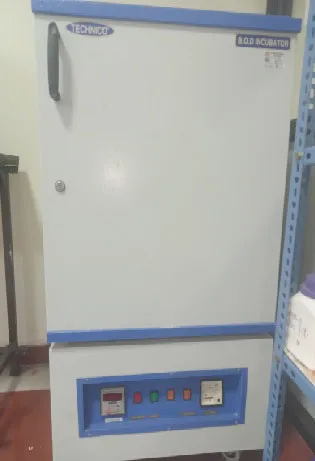
Cooling centrifuge
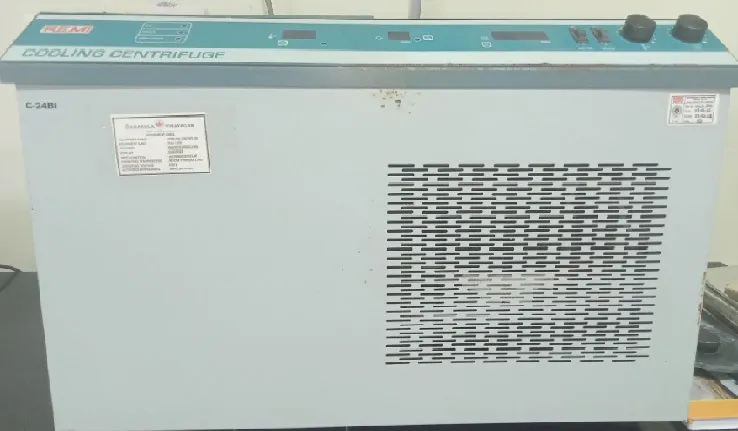
ELISA Reader
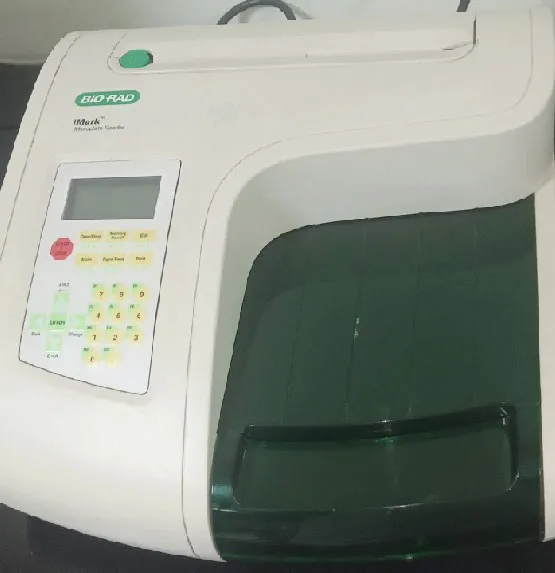
PCR (Gradient thermal cycler)
_for_PC.webp)
HPLC
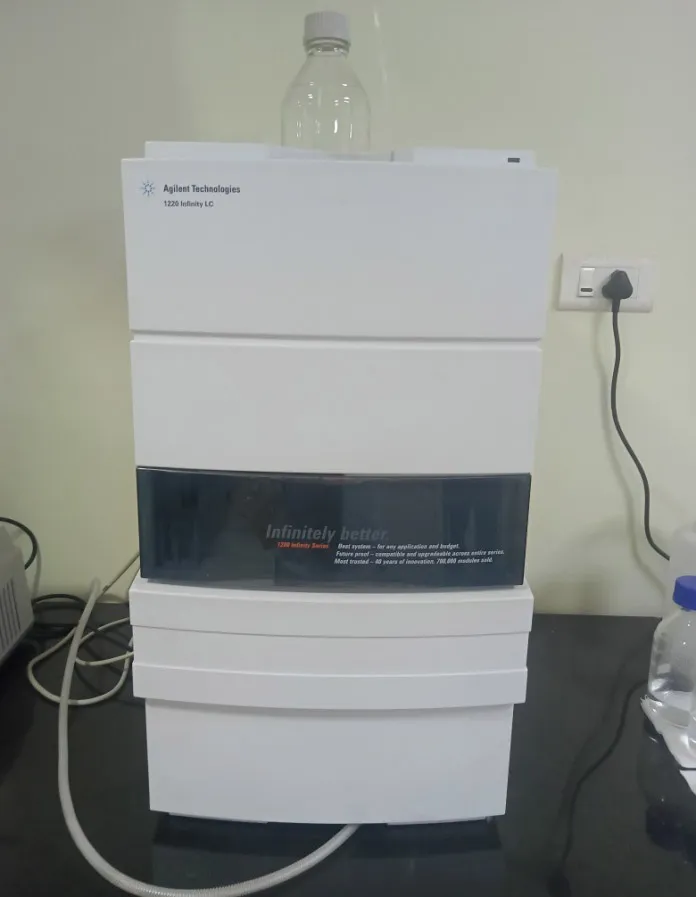
Incubator
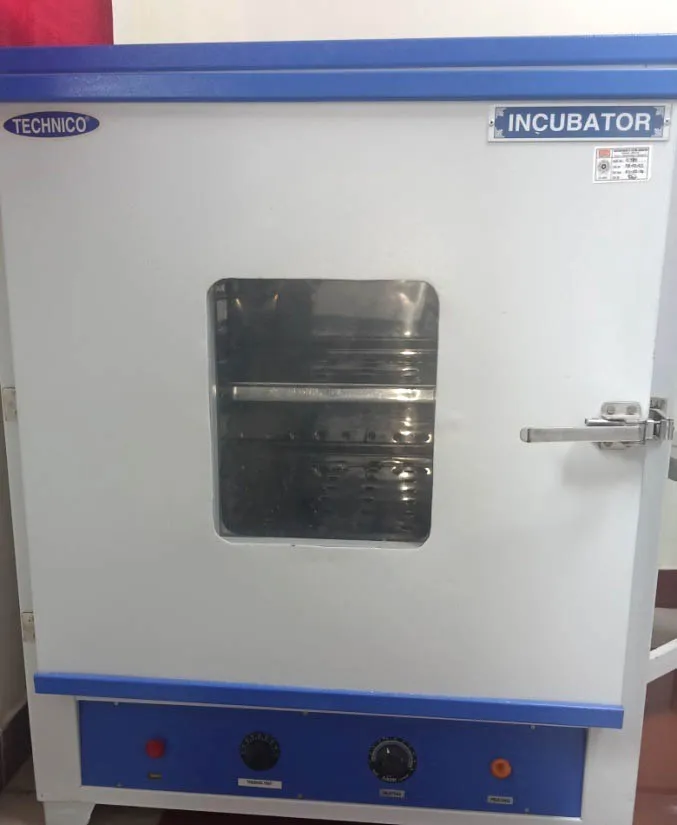
Gel documentation system
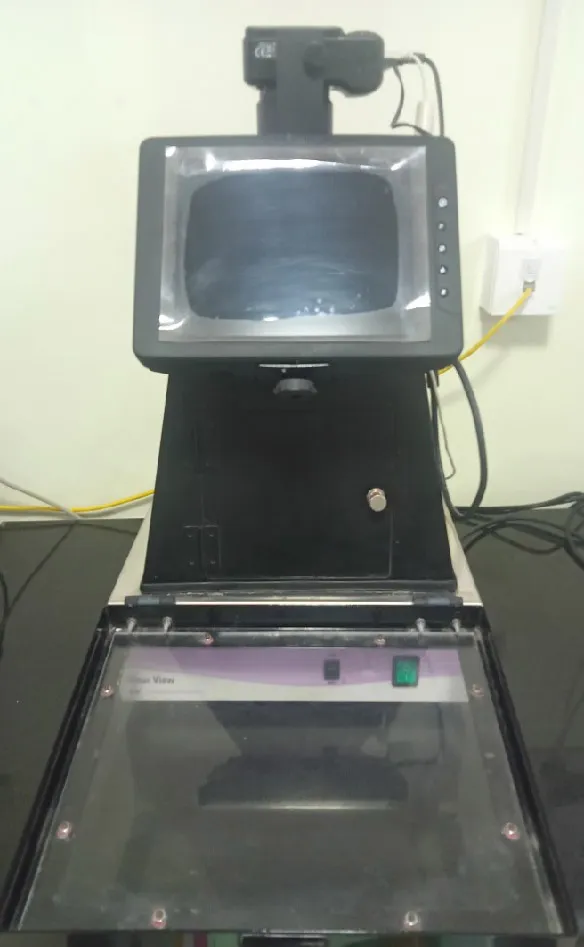
Gel electrophoresis unit

Spectrophotometer
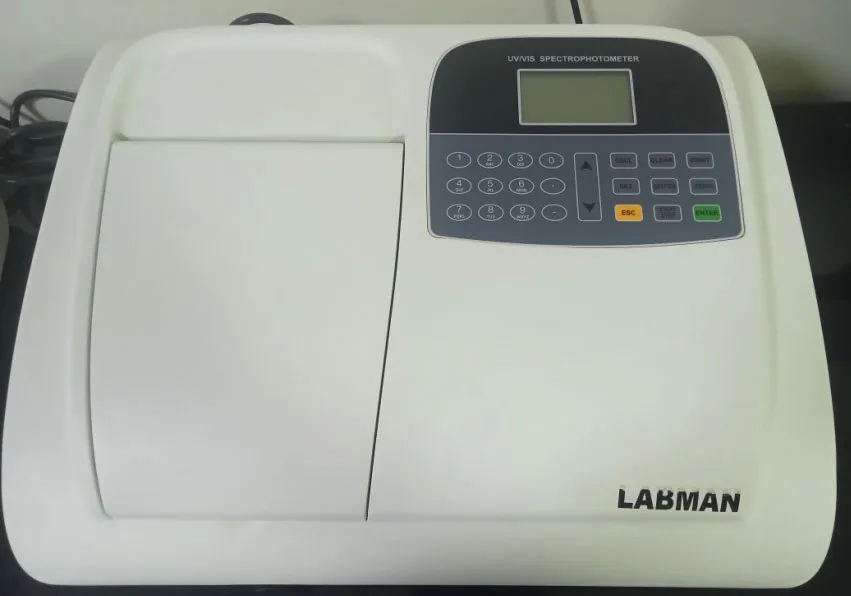
PCR (Conventional Thermal cycler)
_for_PCR.webp)
Maintenance of instruments
- Installation of the instrument followed by periodical calibration of the instrument as per the standard guidelines.
- Documentation of instruments user manuals and troubleshooting requirements.
- Upon any technical issue, the biomedical group of SMVMCH will be contacted for necessary action.
- Annual maintenance contract will be done for each instrument.
- Logbooks for the instruments are maintained in the laboratory.
Research
Research interests
- Genetic Polymorphism studies
- Molecular Taxonomy
- Clinical Microbiology
- Biochemical Studies
Molecular and analytical techniques
- Isolation of DNA from blood
- Isolation of DNA from bacterial culture
- Electrophoretic Techniques
- Enzyme Linked Immuno Sorbent Assay (ELISA)
- Polymerase Chain Reaction (PCR)
- Restriction Fragmented Length Polymorphism (RFLP)
- High Performance Liquid Chromatography (HPLC)
- Spectrophotometric analysis
Joining research at CRL
1. Collaborative Research
- The Principle Investigator (PI) is requested to discuss the project concept and expected collaboration from CRL with HOD, Biochemistry to ensure the feasibility to use CRL facility and faculty support.
- PI should officially forward a letter through the parent department to HOD Biochemistry to conduct research at CRL through proper channel.
2. Utilization of the CRL Instruments for Research purpose
- UG/PG students and faculty should forward letter through the parent department to HOD Biochemistry to obtain permission to use CRL instruments.
- The instruments will be permitted to be operated by the user with the help of concerned person in CRL.
- Data generated will be documented by Research Assistant and approved by Research Scientist at CRL and HOD, Biochemistry.
List of ongoing projects
| Sl. No | Project Title | PI | Co- PI | Year of ethical approval |
| 1. | Study of Prognostic value of Interleukin-6 levels in sepsis patients | Dr. M. Anil Kumar (PG) Dept. of General Medicine | Dr. I. S. S. Suman Babu Dept. of General Medicine | 04.03.2024 |
| 2. | A study on correlation of urinary liver type fatty acid binding protein (L-FABP) as early biomarker of acute kidney injury | Dr. Atul Vaisakh Kochan Vijayan (PG) Dept. of General Medicine | Prof. Dr. M.K. Uthaya Sankar Dept. of General Medicine Dr. Ravikumar Dept. of Nephrology | 04.03.2024 |
| 3. | A study on the clinical significance of serum Interleukin-6 in heart failure patients | Dr. Harikrishnan G.R. (PG) Dept. of General Medicine | Prof. Dr. A.K. Badrinath Dept. of General Medicine | 10.04.2023 |
| 4. | Study of correlation of stroke prediction scores in heart failure with reduced ejection fraction patients without atrial fibrillation | Dr. P. Ragavi (PG) Dept. of General Medicine | Prof. Dr. A.K. Badrinath Dept. of General Medicine | 10.04.2023 |
| 5. | Comparing urine Trypsinogen activating peptide with C-reactive protein, serum amylase in assessing the severity of acute alcoholic pancreatitis | Dr. T. Shobana (PG) Dept. of General Medicine | Prof. Dr. C. Manokaran Dept. of General Medicine | 10.04.2023 |
| 6. | Correlation between IL-6 and the angiographic severity of Coronary artery disease in Acute coronary syndrome patient | Dr. Ezhil Kumar. M (PG) Dept. of General Medicine | Prof. Dr. M.K. Uthaya Sankar Dept. of General Medicine Prof. Dr. Ashida T.S. Dept. of Cardiology | 13.03.2023 |
| 7. | Identification of clusters of Type 2 Diabetes mellitus and its association with micro vascular complications- A rural hospital study | Dr. A. Naveen (PG) Dept. of General Medicine | Prof. Dr. S. Girija Dept. of General Medicine | 03.03.2023 |
| 8. | Serum Folic acid assay on long term Methotrexate therapy in Psoriatic patients- A case control study | Dr. E. Ragul Raj (PG) Dept. of Dermatology | Prof. Dr. K. Karthikeyan Dept. of Dermatology | 10.10.2022 |
List of Completed projects
| Sl. No | Project Title | PI | Co- PI | Year of project completion |
| 1. | A study of comparison of serum Keratin-18 level with child pugh’s score in assessing severity in patients with end stage alcoholic liver disease | Dr. B. Vidhya (PG) Dept. of General Medicine | Prof. Dr. M. K. Uthaya Sankar Dept. of General Medicine | 2024 |
| 2. | Predictive role of urinary biomarkers KIM-1 in early diagnosis of AKI in sepsis hypovolemia | Dr. Abhinav (PG) Dept. of General Medicine | Prof. Dr. Manokaran Dept. of General Medicine | 2024 |
| 3. | Serum Pentraxin-3 as a prognostic marker of sepsis in intensive care patients | Dr. Jayasuriya (PG) Dept. of General Medicine | Dr. J. Sathiyanarayanan Dept. of General Medicine | 2024 |
| 4. | A study on correlation of serum superoxide dismutase level with severity of alcoholic peripheral neuropathy | Dr. Adrin Suthir (PG) Dept. of General Medicine | Prof. Dr. M. K. Uthaya Sankar Dept. of General Medicine Dr. Balachandran M. Dept. of Neurology | 2024 |
| 5. | A study on serum cytokeratin 18 level in non-obese and non-alcoholic fatty liver disease in a tertiary setup | Dr. Pravin Coumar (PG) Dept. of General Medicine | Dr. G. Premkumar Dept. of General Medicine | 2024 |
| 6. | Autoimmune diabetes in patients with type 2 diabetes mellitus- a hospital based study | Dr. Pooja N. U. (PG) Dept. of General Medicine | Prof. Dr. S. Girija Dept. of General Medicine | 2024 |
| 7. | Study of comparison of high sensitive CRP to pre albumin ratio in acute coronary syndrome patients | Dr. Aakash T. Ajith (PG) Dept. of General Medicine | Prof. Dr. A.K. Badrinath Dept. of General Medicine | 2024 |
| 8. | Correlation between serum apelin levels with left ventricular mass in type 2 diabetes mellitus patients | Dr. Deepsheeka. G. (PG) Dept. of General Medicine | Prof. Dr. A. K. Badrinath Dept. of General Medicine | 2024 |
| 9. | Influence of SLC22A1 rs628031 and SLC47A1 rs2289669 genetic polymorphism on metformin response in South Indian patients with type 2 diabetes mellitus | Dr. D. Anuranjani (PG) Dept. of Pharmacology | Prof. Dr. S. Asmathulla Dept. of Biochemistry | 2022 |
| 10. | Association of genetic polymorphism of TCF7L2 gene among gestational diabetes mellitus subjects of South India | Dr. S. Suganya (PG) Dept. of Biochemistry | Prof. Dr. S. Asmathulla Dept. of Biochemistry | 2022 |
| 11. | Influence of MDR1 polymorphism rs1045642 and rs1128503 on Metformin response in South Indian patients with type 2 diabetes mellitus | Dr. T. Vijaya Santhi (PG) Dept. of Pharmacology | Prof. Dr. Nitya Dept. of Pharmacology | 2022 |
| 12. | To study VKORC1 gene polymorphism and CYP2C9 polymorphism status in patients on Acenocoumoral and its effect on therapeutic response | Dr. S. Meghana (PG) Dept. of General Medicine | Prof. Dr. S. Girija Dept. of General Medicine | 2022 |
| 13. | A study on genetic polymorphism of Interleukin-6 and Interleukin-10 and their association with cardiometabolic risk factors in Hashimoto’s Thyroiditis | Mrs. R. Rajarajeswari Dept. of Biochemistry | – | 2021 |
| 14. | Antibiotic resistance pattern of Mycobacterium leprae among the patients of pre and post treatment tenure | Dr. B. Manjula (PG) Dept. of Dermatology | Dr. Hima Gopinath, Prof. Dr. K. Karthikeyan Dept. of Dermatology | 2021 |
| 15. | Evaluation of fine needle aspiration findings in Lymphadenitis – study in a tertiary care hospital | Dr. Shanmugasundari (PG) Dept. of Pathology | Prof. Dr. Erli Amel Ivan Dept. of Pathology | 2021 |
| 16. | Effect of Ethanolic extract of Moringa oleifera leaf on testis of Wistar rats exposed to 4G cell phone radiation. | Mrs. R. Sudha Dept. of Anatomy | – | 2021 |
| 17. | Study of Vitamin-D Receptor gene polymorphism and to analyse the allele frequency among Chronic Kidney Disease patients in South Indian population. | Dr. B. Ramya (PG) Dept. of Biochemistry | Prof. Dr. S. Asmathulla Dept. of Biochemistry | 2019 |
| 18. | Prevalence and Molecular Characterization of HHV 6 and HHV 7 in patients with Pityriasis Rosea (PR) using polymerase chain reaction in a tertiary care hospital, Puducherry | Dr. M. Rangaraj Dept. of Dermatology | Prof. Dr. K. Karthikeyan Dept. of Dermatology | 2019 |
| 19. | Leptin gene polymorphism and pro-inflammatory cytokines profile among coronary artery disease patients with clustered cardiovascular diseases risk factors | Prof. Dr. Ashida T.S Dept. of Cardiology | Dr. R. Balamurugan CRL | 2018 |
| 20. | Molecular diagnosis of Prolidase deficiency | Dr. David Polly (PG) Dept. of Dermatology | Prof. Dr. K. Karthikeyan Dept. of Dermatology Prof. Dr. S. Asmathulla Dept. of Biochemistry | 2018 |
| 21. | Prevalence and Molecular characterization of Extended Spectrum Beta Lactamase (ESBL) producing bacteria in rural tertiary care hospital, Puducherry | Dr. Sunil S. Shivekar Dept. of Microbiology | Mr. M. Kaviraj CRL | 2018 |
| 22. | The study of prevalence and molecular characterization of Helicobacter pylori in dyspepsia | Dr. S. Yogesh (PG) Dept. of General Medicine | Prof. Dr. M. K. Uthaya Shankar Dept. of General Medicine Dr. Thirumal. P Dept. of Gasteroenterology | 2018 |
| 23. | Determination of helicobacter pylori virulence markers in clinical isolates by molecular typing and its association in pathogenesis | Dr. R. Balamurugan CRL | – | 2018 |
| 24. | Oxidative stress, Lipid levels in fatty liver disease | Ms. Jayashree (II-year MBBS) | Ms. G. Agilandeswari Dept. of Biochemistry | – |
| 25. | Mineral content in urine of patients with urinary tract infection | Mr. R. Rajprasath (M.Sc) Dept. of Biochemistry | Prof. Dr. S. Asmathulla Dept. of Biochemistry | 2015 |
| 26. | Causative factors for elevated serum transaminases and their relation with oxidative stress in a tertiary hospital | Ms. J. Yogapriya (M.Sc) Dept. of Biochemistry | Prof. Dr. S. Asmathulla Dept. of Biochemistry | 2015 |
| 27. | Lipid peroxidation and antioxidants with lipid profile in pulmonary tuberculosis | Ms. K. Elakiya (M.Sc) Dept. of Biochemistry | Prof. Dr. S. Sumathi Dept. of Biochemistry | 2015 |
| 28. | gyrA ser83 mutation analysis in Escherchia Coli and Klebsiella pneumoniae in a tertiary care hospital, Puducherry | Dr. G. Muthu CRL | – | 2014 |
Publications
| Sl. No | Article |
| 1. | Madhavan H, Nobel MM, Rajalakshmi M, Kulkarni S, Thomas TRA, Shalini B, Mohan R. Sociodemographic features, serum urea, creatinine and blood urea nitrogen/creatinine ratio in chronic kidney disease patients–A record based retrospective study. Glob J Health Sci Res.2024;1-4. |
| 2. | Badrachalam R, Mani V, Kumar R, Shafiulla A. Vitamin D receptor (BsmI) gene polymorphism and allele frequency among chronic kidney disease patients in south Indian population. Bioinformation. 2023;19(4):380. |
| 3. | Manjula B, Gopinath H, Karthikeyan K. Resistance to anti-leprosy drugs: A cross-sectional study from a tertiary care hospital in Puducherry. Indian J Dermatol Venereol Leprol. 2023;89(3):456-8. |
| 4. | Mathayan M, Suresh A, Balamurugan R, Jayaraman S. Immune Stimulation effects of Pongamia pinnata extracts, an In vitro Analysis. Research J Pharm and Tech. 2020;13(1):308-12. |
| 5. | Dinesh D, Vidjai Vikram S, Balasubramanian S, Lazarus SP, Suresh Kumar K, Rajprasath R. A Study on the Effect of Lateral and Sitting Positions in Spinal Anesthesia for Cesarean Sections. Indian J Anesth Analg. 2020;7(1)(Part-I):33–40. |
| 6. | Murgaiyan R, Kaliyaperumal K, Rangasamy B. Prevalence and Molecular characterization of Human Herpes Virus 6 and 7 in patients with Pityriasis Rosea using Polymerase Chain reaction in a tertiary care hospital, Puducherry. Int. J Res Dermatol. 2019;5(4):728-731. |
| 7. | Ahamed AM, Kumar KS, Balasubramanian S, Lazarus SP, Vidjai Vikram S, Rajprasath R. A comparative study on the Endotracheal Tube cuff pressure changes between supine and Prone in patients undergoing Prone position surgeries. Indian J Anesth Analg. 2019;6(5):1599-603. |
| 8. | Ashida TS, Balamurugan R. Effect of Intracoronary Nicorandil compared to Nitroglycerin on Coronary Diameter and Hemodynamics following Balloon Dilatation during Elective PTCA. J Cardiovasc Med Surg. 2019;5(2):57-60. |
| 9. | Mangaiyarkarasi T, Gopal R, Shivekar SS, Kaviraj M, Balamurugan R. Analysis of epidemiological and demographic component of dengue in rural Puducherry – A hospital based study. Indian J Microbiol Res. 2019;6(3):225-228 |
| 10. | Arulmani A, Kumar KS, Balasubramanian S, Lazarus SP, Sanmugapiriya K, Rajprasath R. Comparative Study of LMA Supreme versus I-gel in Patients Undergoing Laparoscopic Surgeries with Positive Pressure Ventilation. Indian J Anesth Analg. 2019;6(2):547-54. |
| 11. | Badrinath P, Balasubramanian S, Kumar KS, Lazarus SP, Rajprasath. Table Tilt versus Pelvic Tilt position for preventing Hemodynamic changes during Spinal Anaesthesia for Caesarean Section. Indian J Anesth Analg. 2019;6(2):399-406. |
| 12. | Mathaiyan M, Suresh A, Balamurugan R. Binding property of HIV p24 and Reverse transcriptase by chalcones from Pongamia pinnata seeds. Bioinformation. 2018;14(6): 279-84. |
| 13. | Karthikeyan K, Polly D, Asmathulla S, Balamurugan R, Kaviraj M. Topical proline therapy in prolidase deficiency. Clinical & Experimental Dermatology. 2019;1;44(3): 344 |
| 14. | Jain SA, Das S, Subashini M, Mahadevan K. Determination of the proportion of refractive errors in patients with primary complaint of headache and the significance of refractive error correction in symptoms relief. Indian Journal of Clinical and Experimental Ophthalmology. 2018;4(2):258-62. |
| 15. | Ashida TS, Sriram R, Balamurugan R. Morning blood pressure surge and it’s relation to hypertensive and organ damage and severity of coronary artery disease. J Cardiovasc Med Surg. 2018;4(3):49-54. |
| 16. | Chaitra S, Das S, Subhashini M, Kaviraj M. A retrospective study of pterygium cases treated in a tertiary care hospital at Puducherry. Int J Ocul Oncol Oculoplasty. 2017; 3(4):273-6. |
| 17. | Das S, Vishwanandha NR, Sindhu, M, Subhashini M, Mahadevan K. A study on the angle of anterior chamber in relation to duration of diabetes mellitus and stages of diabetic retinopathy. Indian Journal of Clinical and Experimental Ophthalmology. 2017;3(3): 270-3. |
| 18. | Muthu G, Mangaiyarkarasi T, Vishnuprabu E, Sathishkumar S. Detection of gyrA ser83 mutation and parC gene amplification in E. coli and Klebsiella pneumoniae from tertiary care hospital, Puducherry. Int J Med Microbiol Trop Dis. 2017;3(4):167-70. |
| 19. | Julius A, Vedasendiyar R, Devakannan A, Rajaraman S, Rangasamy B, Saravanan V. Effect of Hesperidin for its Anti-Proliferative Activity on Liver Cancer and Cardio Vascular Diseases. Res J Pharm Technol. 2017;10(1):307–8. |
| 20. | Mohamedali S, Rafi N, Mahadevan K, Rangasamy G. Speciation of enterococci isolated from clinical specimens and determination of HLG and vancomycin resistance. J Evolution Med Dent Sci. 2017;6(36): 2973-6. |
| 21. | Anbarasi AC, Divya N, Subhashini M, Das S, Mahadevan K. Analysis of the effects of cataract surgery on corneal sensation variation after SICS and phacoemulsification. Indian Journal of Clinical and Experimental Ophthalmology. 2016;2(4): 287-9. |
| 22. | Vidhya NP, Das S, Priyadarshini R, Subashini M, Mahadevan K. A comparative study on the intraocular pressure among diabetic and non-diabetic patients. Indian Journal of Clinical and Experimental Ophthalmology. 2016;2(4):378-80. |
| 23. | Rangasamy B, Ali SM, Mahadevan K, Maraudavanan R. A study on the rate of vacA genotypes of H.pylori in gastric biopsies obtained from patients with symptomatic upper GI disorders. Int J Curr Microbiol App Sci. 2016;5(12): 603-8. |
| 24. | Balamurugan R, Saleem M, Gopal R, Kaviraj M, Mangaiyarkarasi T, Shivekar SS, Kalaiselvan G. Prevalence of HIV seropositivity among the patients attending tertiary care hospital at Puducherry, India. Int J Res Med Sci. 2016;4(7):2725-7. |
| 25. | Balamurugan R, Shivekar SS, Gopal R, Kaviraj M, Mangaiyarkarasi T, Saleem M. Seroprevalence of Dengue in Rural Tertiary Care Hospital at Puducherry-A Retrospective Study. Int J Curr Microbiol App Sci. 2016;5(6): 130-4. |
| 26. | Balamurugan R, Gopal R, Saleem M, Kaviraj M, Shivekar SS, Mangaiyarkarasi T. Prevalence of hepatitis B surface antigen among patients attending a rural teaching hospital at Puducherry. Ind J Microbiol Res 2016:3(1):74-6. |
| 27. | Patil AS, Ramachandran M, Mohan RK, Mahadevan K, Rangasamy B. Histopathological Evaluation of Endoscopic Biopsies in patients with lesional gastrointestinal tract disorders. J Evolution Med Dent Sci. 2016;5(1):1-3. |
| 28. | Saleem M, Marudavanan R, Gopal R, Shivekar SS, Mangaiyarkarasi T. A comparative study of rapid urease test and dilute carbol fuchsin staining technique for diagnosis of Helicobacter pylori infection. Int J Res Med Sci. 2015;3(12):3608-10. |
| 29. | Ananthamurugan E, Saleem M, Gopal R, Shivekar SS, Kaviraj M, Balamurugan R. Prevalence of helicobacter pylori infection in patients with atrophic gastritis and role of dark field microscopy in diagnosis. J Evolution Med Dent Sci. 2015;4(93): 15873-5. |
| 30. | Arjun B, Annamalai A, Balamurugan R, Shivekar SS, Kaviraj M. A clinico-endoscopic study of upper GI disorders in rural population of Pondicherry. Int J Cur Res Rev. 2015;7(20): 37-40. |
| 31. | Saleem M, Subha TV, Balamurugan R, Kaviraj M, Gopal R. Bacterial Profile and Antimicrobial Susceptibility Pattern of Surgical Site Infections-A Retrospective Study. Indian J Appl Res. 2015;10(2):204-6. |
| 32. | Shivekar SS, Manikandan R, Balamurugan R, Kaviraj M, Suresh A. Incidence of MDR-Bacterial colonization in the surgical ward patients in rural tertiary care hospital, Puducherry. International Journal of Recent Trends in Science and Technology. 2015;16(2):478-81. |
| 33. | Kalaimathi SK, Muthu G, Manjula K. Antibacterial activity of Lobelia nicotianifolia against various bacterial strains. Int J Life Sci Pharma Res. 2015;5:19-25. |
| 34. | Muthu G, Iniyan GT, Shanmugam J, Mangaiyarkarasi T. Molecular detection of blaCTX-M and blaSHV genes in Escherichia coli and Klebsiella pneumoniae in a tertiary care hospital in Puducherry, India. International Journal of Pharma and Bio Sciences. 2014;5(1):689-96. |
Academic Programs
Laboratory training of IV year MBBS students (2024)
Two sessions of laboratory training was conducted for 1Vth year MBBS students from 29.01.2024 – 12.02.2024 and 07.04.2024 – 21.04.2024. The program started with a brief introduction about CRL followed by a pre-test. Theoretical aspects of relevant biochemical and molecular biology techniques, basics of bioinformatics and a brief account of research methodology were included in the theory classes. Practical sessions were equally beneficial to instill knowledge on techniques like DNA isolation from blood and bacterial colonies, gene amplification and polymorphism detection by PCR-RFLP and separation of DNA by agarose gel electrophoresis. The program was concluded with submission of student’s log book, post-test and feedback.
Session 1: 29.01.2024 – 12.02.2024
Session 2: 07.04.2024 – 21.04.2024
Student Initiated Research
Session 1: 29.01.2024 – 12.02.2024
Session 2: 07.04.2024 – 21.04.2024
The program was aimed to develop research aptitude among medical students by selecting a research topic as a short term project after thorough discussion with the participants and faculty of CRL and HOD, Biochemistry. It was beneficial for the students in terms of learning the process of development and execution of a research problem. The students carried out retrospective studies on clinical parameters associated with a disease condition. The entire process helped the students to learn how to select a specific research topic, data collection, sorting and analysis, interpretation of results and report writing.
Completed projects
| SI. NO. | Topics | Name of the student | Course & Batch |
| 1. | A Clinical Audit on Postpartum Hemoglobin levels: A Study on Postpartum Anemia | Jennifer John & Arsha A R | IV MBBS (2020-2025) |
| 2. | A Clinical Audit on association between Platelet levels & Dengue fever in a tertiary care hospital | Esther Lydia Festus & Lakshiya M R | IV MBBS (2020-2025) |
| 3. | A Clinical Audit on Serum sodium, potassium and Troponin-I level in Myocardial Infarction Patients | Menagadevi B & Harsheni M | IV MBBS (2020-2025) |
| 4. | A Clinical Audit on the association of Urea and Creatinine levels and BUN-creatinine ratio in Chronic Kidney Disease patients | Madhavan H & Melanie Mariyam Nobel | IV MBBS (2020-2025) |
| 5. | A Clinical Audit on the Prevalence of Scabies in a tertiary care centre | Supriya R A L | IV MBBS (2020-2025) |
Laboratory training of IV year MBBS students (2023)
Session 1: 20.02.2023 – 05.03.2023
Session 2: 06.03.2023 – 19.03.2023
Laboratory training session started with an introduction about CRL instrumentation facilities followed by a pre-test. Theory sessions included presentations on DNA isolation and separation techniques, molecular techniques to identify genes and alleles, basics of bioinformatics, biochemical separation techniques and introduction to research methodology. During the practical sessions, students participated in the isolation of DNA from whole blood and bacterial colonies, gene amplification and polymorphism detection by PCR-RFLP, separation of DNA by agarose gel electrophoresis and protein separation by serum electrophoresis. The training program concluded with the submission of logbook, post-test and feedback.
Events
Research Week Celebration
Event Report: Workshop on ‘Molecular Biology Techniques’
Time : 09.00 – 04.00 pm
Venue : Central Research Laboratory, Dept. Of Biochemistry
Organized by: Central Research Laboratory
Coordinator: Dr. G. Muthu, Senior Scientist & Laboratory Supervisor
Participant Details: B.SC. MLT & DMLT students
Overview
On December 4th, 2024, the Molecular Biology Techniques workshop was successfully conducted at the Central Research Laboratory. The program aimed to provide participants with hands-on experience and theoretical knowledge of the processes involved in Molecular Biology Techniques.
Agenda
- Introduction about the workshop to the participants
- Pre-test
- Presentation on DNA Isolation and Applications
- Presentation on PCR Technique
- Presentation on DNA separation by agarose gel electrophoresis
- Inauguration
- Group wise training on DNA Isolation from whole blood by salting out method
- Demonstration of PCR Technique and DNA separation by agarose gel electrophoresis
- Scientific Discussions, Post-test and Feedback session.
Highlights
The workshop was helpful to DMLT and BSc MLT students to gain knowledge on topics related to DNA isolation, PCR technique and gel electrophoresis, along with practical experience.
Presentations
- Presentation on “DNA Isolation and Applications” by Dr. G. Muthu, Senior Scientist & Laboratory Supervisor, Central Research Laboratory.
- Presentation on “PCR Techniques” by Dr. Tresa Remya A. T, Research Scientist, Central Research Laboratory.
- Presentation on “DNA Separation by agarose gel electrophoresis” by Ms. B. Shalini, Research Assistant, Central Research Laboratory.
Inauguration
- An inauguration event was held after the theory sessions at Biochemistry Demo room-1 with the inaugural address by respected Deputy Director cum Dean Dr. R.N. Kagne and felicitation by Dr. M. Jeyakumar, Professor and Head, Department of Biochemistry and Dr. G. Muthu, Senior Scientist & Laboratory Supervisor, CRL.
Hands on training
- Group wise hands-ontraining on DNA Isolation from whole blood by salting out method was conductedin the fore-noon session under the guidance of experienced instructors Dr. G. Muthu, Dr. Tresa Remya A.T, Mr. R. Balakrishna Pai,Dr. S. Suganya, Mr. R. Rajprasath, Mrs. K. Elakiya and Ms. B. Shalini.The session provided practical insights into DNA isolation procedure in detail.
- In the afternoon session, PCR was demonstratedto the participants and performed theseparation of DNA and amplified PCR products by agarose gel electrophoresis at Central Research Laboratory under the guidance of Dr. G. Muthu, Dr. Tresa Remya A.T and Ms. B. Shalini.
- The students were enthusiastically participated in the workshop and engaged in the discussion session, seeking clarifications and sharing their experiences, fostering a dynamic learning environment.
Outcome
The students successfully isolated DNA from whole blood using the salting-out method, actively participated in the demonstration of PCR, and separated DNA as well as amplified gene fragments through agarose gel electrophoresis. During the workshop, participants acquired fundamental knowledge on preparing the reagent like Tris-Acetic Acid-EDTA (TAE) buffer and agarose gel. They were also taught specific role of each reagent involved in the DNA isolation from whole blood.
Conclusion
The workshop on Molecular Biology Techniques concluded successfully with post-questionnaire and feedback. The results were highly appreciable, and response of the participants were encouraging as well.
Future Directions
Based on the success of this program, organizers are planning to conduct workshops related to molecular techniques like different methods of nucleic acid isolation, PCR-RFLP, protein separation etc.
Acknowledgements
The organizers extend their gratitude to our management and participants for their contributions to make the event a great success.
Report on In house training program on ISO 15189: 2022
Date: 06.08.2024 to 09.08.2024 (1st batch)
20.08.2024 to 23.08.2024 (2nd batch)
Venue: Lecture Hall II , SMVMCH
Name of the organizing department: Central Laboratory
Nature of Delegates: Lab Technician (58)
Name of the sponsoring agency: Nil
Sessions Conducted:
| Schedule | ||||
| S.No | Date | Time | Training Topic | Resource faculties |
| 1 | 6.8.24 & 20.8.24 | 1.45 pm to 4.00 pm | Introduction to workshop | Dr. V.Sriram |
| ISO Clause: 4.1-4.3 | ||||
| ISO Clause: 5.1-5.6 | ||||
| 2 | 7.8.24 & 21.8.24 | 1.45 pm to 4.00 pm | ISO Clause: 6.1-6.8 | Dr.G.Revathy |
| 3 | 8.8.24 & 22.8.24 | 1.45 pm to 4.00 pm | ISO Clause: 7.1-7.8 | Dr.M.Jeyakumar |
| 4 | 9.8.24 & 23.8.24 | 1.45 pm to 4.00 pm | ISO Clause: 8.1-8.9 | Dr.T.Mangaiyarkarasi |
World DNA Day (25.04.2024), Workshop on DNA Isolation and Separation
Date: 25.04.2024
Venue: Demo – 2, Department of Biochemistry & CRL
Time: 09.30 – 04.00 pm
Organizers: Central Research Laboratory & Department of Biochemistry
The program was aimed to provide hands-on experience and theoretical knowledge of the processes involved in DNA isolation and separation. Participants included 23 students of 2nd year DMLT and B. Sc MLT, School of Allied Health Sciences.
The event started with a brief introduction of the workshop by Dr. Kulkarni Sweta, Professor and HOD, Department of Biochemistry followed by distribution of files to the participants by faculty of Biochemistry and CRL. Further, the workshop began with a pre-test and presentation on ‘DNA Isolation and Applications’ by Dr. Tresa Remya A. T, Research Scientist, CRL followed by Presentation on “DNA Separation by agarose gel electrophoresis” by Ms. B. Shalini, Research Assistant, CRL.
Group wise hands on training on DNA Isolation from whole blood by salting out method was performed under the supervision of Dr. Tresa Remya A.T, Dr. S. Suganya, Mrs. K. Elakiya, Mr. R. Rajprasath, Ms. B. Shalini and Ms. J. Jasmine Manna Rani, and provided insights into DNA isolation procedure to the participants.
In the afternoon session, students carried out separation of the isolated DNA by agarose gel electrophoresis at CRL under the guidance of Dr. Tresa Remya A.T, Mr. R. Rajprasath and Ms. B. Shalini. Event concluded with post-test and feedback
Lab visit - 2023
Date: 06.09.2023
Venue: Biochemistry Department Demo – 2, CRL
Time: 01.00 – 04.30 pm
Organizers: Central Research Laboratory
One day Lab Visit for II B. Sc. (Hons.) Agriculture students of Sri Manakula Vinayagar Engineering College was organized by the Central Research Laboratory (CRL), Department of Biochemistry, SMVMCH. About 30 students participated in the lab visit. The program began with a brief introduction by Dr. Kulkarni Sweta, Professor and Head, Department of Biochemistry followed by presentations on ‘Polymerase chain reaction (PCR)’ and ‘DNA separation by agarose gel electrophoresis’ by Dr. Tresa Remya A. T, Research Scientist, CRL. Further, the students visited CRL instrumentation facility to know about the operation and applications of the instruments. Illustration of separation of PCR product by agarose gel electrophoresis was performed under with the supervision of Dr. Tresa Remya A. T and B. Shalini, Research Assistant, CRL. The students were enthusiastically participated in all the sessions and the organizers received positive responses for the event.
Workshop on DNA Isolation and Separation (28.04.2023)
Date: 28.04.2023
Venue: Demo – 2, Department of Biochemistry & CRL
Time: 09.30 – 04.00 pm
Organizers: Central Research Laboratory & Department of Biochemistry
The event started with a prayer and welcome address by Mr. Balakrishna Pai R and the formal inauguration of the workshop was done by the Deputy Director and Dean Dr. Kagne R. N in a lamp lighting ceremony. Dr. R. Gopal, Professor and Head, Department of Microiology & Dean, School of Allied Health Sciences and Dr. Kulkarni Sweta, Professor and Head, Department of Biochemistry felicitated the event.
The workshop started with a pre-questionnaire followed by two consecutive theory sessions on ‘DNA isolation and applications’ and ‘DNA separation by agarose gel electrophoresis’. The respective sessions were taken by the resource persons Dr. Tresa Remya A. T. And Mr. R. Rajprasath. Further, the practical sessions began at Biochemistry student’s lab with the supervision of two more resource persons Mrs. K. Elakiya, and Dr. S. Suganya. The participants successfully isolated DNA from whole Blood by salting out method and separated the DNA by agarose gel electrophoresis. The workshop offered training to 17 students from School of Allied Health Sciences. The students were enthusiastically participated in the workshop, the event concluded with post-questionnaire and the results were highly appreciable.
Workshop on DNA Isolation and Separation (17.02.2023)
Date: 17.02.2023
Venue: Demo – 2, Department of Biochemistry & CRL
Time: 09.30 – 03.45 pm
Organizers: Central Research Laboratory & Department of Biochemistry
The Workshop on ‘DNA Isolation and Separation’ was organized by the CRL in association with the Department of Biochemistry, SMVMCH. The workshop offered training to 26 students from II & III year Allied Health Sciences on DNA isolation from whole blood sample and further separation by agarose gel electrophoresis. The workshop started with a pre-questionnaire followed by two consecutive theory sessions on ‘DNA isolation and applications’ by Dr. Tresa Remya A. T, Research Scientist, CRL and ‘Agarose gel electrophoresis’ by Mr. R. Rajprasath, Research Assistant, CRL. An inauguration event was conducted after the theory sessions at Biochemistry Demo room-2 with the inaugural address by respected Director Dr. D. Rajagovindan and felicitation by Dr. R. Gopal, Professor and Head, Department of Microbiology and Dean, School of Allied Health Sciences.
Further, the practical sessions started at Biochemistry student’s lab, the participants successfully isolated DNA from whole blood and separated it by agarose gel electrophoresis. The students were enthusiastically participated the workshop, the event concluded with post-questionnaire and the results were highly appreciable.
Lab visit - 2022
Date: 05.08.2022
Venue: Demo – 2, Department of Biochemistry & CRL
Time: 10.30 am – 04.00 pm
Organizers: Central Research Laboratory
The Lab Visit for Ist year B.Sc. (Hons.) Horticulture students of Sri Manakula Vinayagar Engineering College was organized by the Central Research Laboratory (CRL), Department of Biochemistry, SMVMCH. About 48 students participated in the lab visit. The event was conducted on 5th August 2022 from 10.30 am to 4 pm at CRL. The program started at 10.30 am with a brief introduction of instrumentation facility of CRL by Dr. S. Asmathulla, Professor and Head, Department of Biochemistry followed by presentation on ‘Introduction of Polymerase Chain Reaction & Agarose Gel Electrophoresis’ by Mr. M. Kaviraj, Research Associate, CRL. Practical sessions on ‘PCR technique’ and ‘DNA separation by agarose gel electrophoresis’ were conducted by M. Kaviraj and R. Rajprasath, Research Assistant, CRL. The students were enthusiastically participated in all the sessions and the organizers received positive responses for the event.
CME on cell culture and molecular techniques in research & diagnostic microbiology
Date: 30.03.2019
Venue: MEU Hall (Ground floor, College Block) & Cell culture lab, CRL
Time: 09.00 am – 04.30 pm
Organizers: Department of Microbiology & Central Research Laboratory
The event started with an introductory talk by Dr. R. Gopal, Professor and Head, Department of Microbiology followed by a presentation on ‘Introduction to cell culture techniques’ Dr. R. Balamurugan, Research Scientist, CRL. After the tea break, the guest of the event Dr. P. Shankar, Asst. Professor, Dept. of Microbiology, Government Medical College, Villupuram delivered a talk on ‘Application of Molecular Techniques in Diagnosis’. Another interesting presentation was done by Dr. R. Udhaya Sankar, Assistant Professor, Department of Microbiology on ‘Molecular epidemiological markers of infectious diseases’. During the afternoon session, demonstration of Peripheral Blood Mononuclear Cell (PBMC) isolation and handling of cell lines was carried out under the supervision of faculties at cell culture lab, CRL and event was successfully concluded.
Lab Safety
General safety precautions
- Handle all samples as potentially infectious agents.
- Handle all reagents with care and avoid contact with eye, mouth and skin.
- Do not perform mouth pipetting.
- Discard used reagents and samples as per disposal procedure.
Environment and safety control
The major modes of contamination when handling potentially infectious agents are:
- Hand to mouth contact
Control: Usage of hand gloves and face mask.
Gloves protect the skin from hazardous materials which may come into contact with hands. However, precautions to be taken while removing the gloves and disposing to prevent contamination from sticking chemicals or infectious agents.
Face mask can be used in laboratory to prevent contamination from biological and chemical materials. Ensure that face masks must be laundered or disposed at the end of the day. Face masks used in a laboratory never be worn outside the lab.
- Hand to eye contact
Control: Usage of hand gloves, safety glasses or goggles.
Safety glasses or goggles will protect eyes from physical or chemical harm.
- Direct contact with superficial cuts, open wounds & other skin conditions that permit absorption into subcutaneous skin layer.
Control: Usage of lab coat, long pants and shoes.
Lab coats will protect clothes, superficial cuts, open wounds of skin from chemical or biological agents and flames in some cases. Long pants and shoes completely covering the top of the foot should be worn at all times when working in the lab.
- Splashes, spills or aerosol contact with skin and eyes.
Control: Usage of lab coat, gloves and goggles
Waste disposal procedure
All laboratory wastes including infectious materials and other liquid and solid wastes will be segregated and discarded in biohazard waste collector bags based on the Bio-Medical Waste Management Rules, 2016.
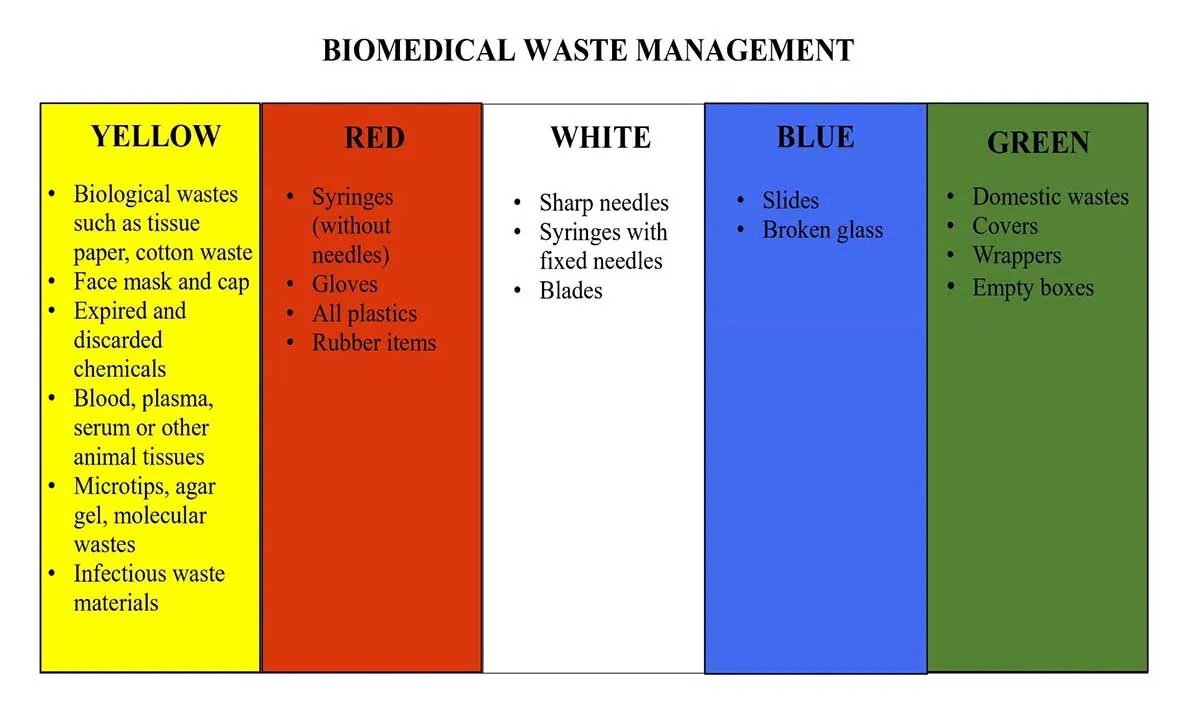
Contact us
- Email ID: [email protected]
- Telephone No.: 0413-2643000, Extn: 2055

